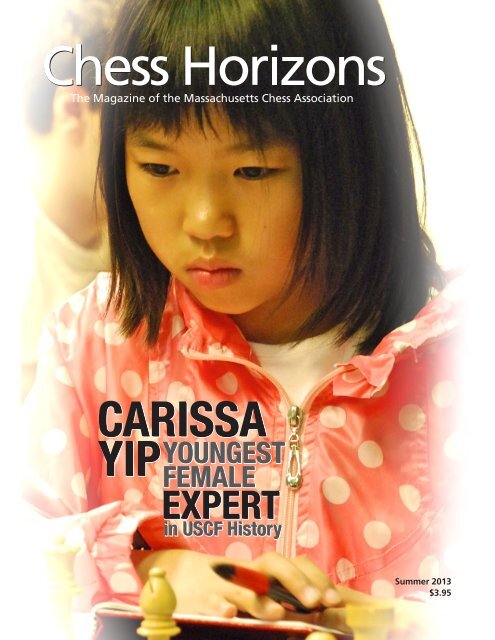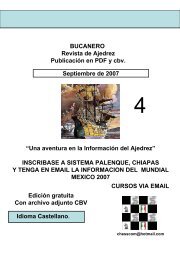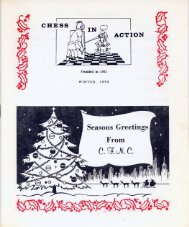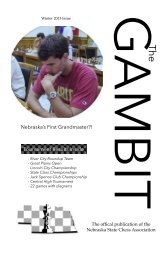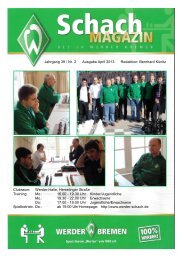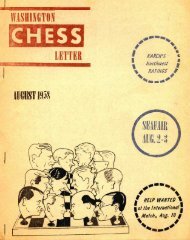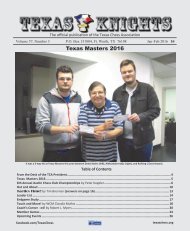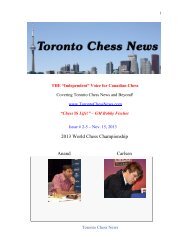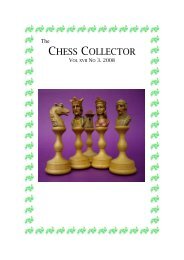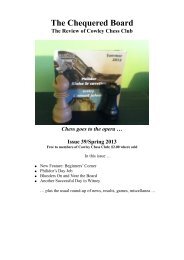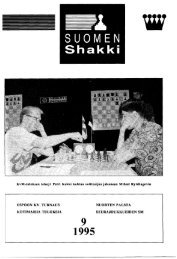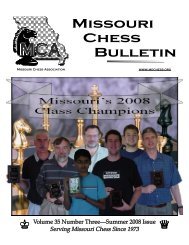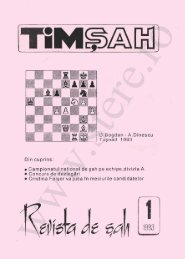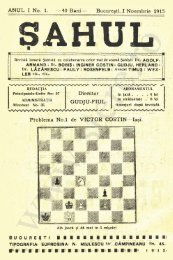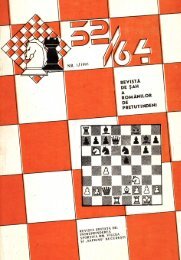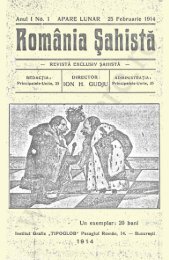Chess Horizons
El ajedrez es un juego, considerado un deporte, entre dos personas, cada una de las cuales dispone de 16 piezas móviles que se colocan sobre un tablero dividido en 64 escaques. En su versión de competición está considerado como un deporte.
El ajedrez es un juego, considerado un deporte, entre dos personas, cada una de las cuales dispone de 16 piezas móviles que se colocan sobre un tablero dividido en 64 escaques. En su versión de competición está considerado como un deporte.
You also want an ePaper? Increase the reach of your titles
YUMPU automatically turns print PDFs into web optimized ePapers that Google loves.
CARISSA<br />
YIP YOUNGEST<br />
FEMALE<br />
EXPERT<br />
in USCF History<br />
Summer 2013<br />
$3.95
73nd New England Open<br />
August 31- September 2 or September 1-2, 2013<br />
Leominster, Massachusetts<br />
$3000 in Projected Prizes, $2250 Guaranteed<br />
Where:<br />
What:<br />
Time Control:<br />
Registration:<br />
Rounds:<br />
Four Points by Sheraton Hotel, 99 Erdman Way, Leominster. 978-534-9000.<br />
Hotel rate $92 per night for 1-4 people, $139, reserve by 8/16.<br />
6-round Swiss. 4 sections: Open (3-day only), U2000, U1750, U1500, with 3 and 2-day schedules.<br />
30/90, SD/60. Rounds 1-3 in the 2-day schedule are G/45.<br />
3-day: Sat. 8/31 from 8:30 to 9:30AM. 2-day (U2000 to U1500 Only): Sun. 9/1 from 8:30-9:30AM<br />
3-day: Sat. 10:00 and 4:00. Sun. 10:00 and 4:00. Mon. 9:30 and 3:30.<br />
2-day: Sun. 10:00, 12:00, 2:00 and 4:00. Mon. 9:30 and 3:30. No 2-day Open.<br />
Entry Fee:<br />
$69 for 3-day, $68 for 2-day if postmarked by 8/26 or online (PayPal) at www.masschess.org by<br />
8/29, $80 at site. $30 discount to unrated in any section and to players in the U1500 section rated<br />
under 1200.<br />
Unrated and<br />
Byes:<br />
Unrated prize limits: $200 in U2000, $150 in U1750, $100 in U1500, can’t win title except in the<br />
Open section. Byes 1-5 in Open, else 1-6, limit 2, rds 4-6 must commit before rd 2.<br />
Prizes:<br />
Prizes are 75% guaranteed based on 80 fully paid entries (unrated and players rated under 1200 in<br />
the U1500 section count half). New England Champion title to the top-scoring New England resident<br />
or student in each section.<br />
Open: $500-250-150 U2200 $200-100 15 Grand Prix Points, FIDE rated<br />
U2000: $300-150-100<br />
U1750: $300-150-100<br />
U1500: $250-125-100 U1350 $125 U1200 $100<br />
USCF membership required for all players, plus state membership for Mass. & N.H. residents. Mass.:<br />
MACA $12 adult, $6 under 18; add $8 (optional) for a subscription to <strong>Chess</strong> <strong>Horizons</strong>), WMCA O.K. N.H.:<br />
NHCA $8 adult, $6 under 19, $10 for membership with a printed N.H. <strong>Chess</strong> Journal subscription.<br />
Questions:<br />
Bob Messenger. Phone (603) 891-2484 or send email to info@masschess.org.<br />
73nd New England Open, August 31– September 2, or September 1-2, 2013<br />
Name:_________________________________________ __ USCF #__________________ Exp:__________<br />
Address: __________________________________________ Phone:___________________ Rating: ________<br />
City/State/Zip: _________________________________________________________________________<br />
Email Address: ________________________________________________ Date of Birth:________________<br />
Need USCF membership? Yes / No Enclosed for USCF is $ ________<br />
Need state membership? Yes / No Enclosed for state is $ ________<br />
3-Day or 2-Day Schedule? 3-Day / 2-Day Entry Fee $ ________ for the _________________ section<br />
Total Enclosed: $________ (please specify section)<br />
Mail checks, payable to MACA, to: Bob Messenger, 4 Hamlett Dr. Apt. 12, Nashua, NH 03062-4641<br />
2 WWW.MASSCHESS.ORG
In This Issue<br />
Opening Moves: An Editorial Page 4<br />
Opening Primer Page 6<br />
Writing for <strong>Chess</strong> <strong>Horizons</strong> Page 8<br />
The Times They Have A-Changed Page 9<br />
Games from the 81st Mass Open Page 12<br />
Vigorito on <strong>Chess</strong> Page 14<br />
<strong>Chess</strong> Masters in Guangzhou Page 18<br />
MACA Gains Its 2013-2014 Board! Page 19<br />
Club News Page 20<br />
Bill Lukowiak — An Appreciation Page 22<br />
Cover photo: Steve Stepak. This last month MA’s own Carissa Yip became<br />
the youngest female USCF Expert on record. The staff at <strong>Chess</strong> <strong>Horizons</strong><br />
offer our congratulations to Carissa on this wonderful achievement.<br />
Look for more details about Carissa’s ratings climb in the Fall issue.<br />
Page Size: 8.5” x 11”<br />
Full Page Rates:<br />
Back Cover: $175<br />
Inside Back Cover: $150,<br />
Inside Front Cover: $150.<br />
1/8th page: $20<br />
Quarter page: $35<br />
Half page: $60<br />
Full: $100<br />
Advertisers<br />
Discount Rates<br />
• 1 ad for 2 issues:<br />
10% off total price<br />
• 1 ad for 3 issues:<br />
15% off total price<br />
• 1 ad for 4 issues:<br />
25% off total price<br />
Free Ad design/layout<br />
available.<br />
All ad copy and its location is subject to final approval by the Editor<br />
of <strong>Chess</strong> <strong>Horizons</strong>. Current circulation is about 600 but varies with<br />
promotional activity. Published by MACA since 1969. Ad payments<br />
must be received prior to deadline (3/01, 6/01, 9/01, 12/01).<br />
The next deadline for submissions is September 1, 2013.<br />
All submissions are accepted and appreciated.<br />
Submissions are preferred via email to “editor@masschess.org”<br />
and in PGN, Word, LibreOffice, or RTF formats.<br />
<strong>Chess</strong><br />
<strong>Horizons</strong><br />
Summer 2013<br />
Volume 45, Number 1<br />
EDITOR<br />
Richard “Doc” Kinne<br />
17 Rush Street, #2<br />
Somerville, MA 02145<br />
editor@masschess.org<br />
LAYOUT EDITOR<br />
Max Sewell<br />
max@tallpinedesign.com<br />
GAMES EDITOR<br />
Nathan Smolensky<br />
nathan.smolensky@gmail.com<br />
ACTING PHOTOGRAPHY EDITOR<br />
Max Sewell<br />
ADVERTISING MANAGER<br />
Position Vacant<br />
ISSN 0147-2569. Published by the Massachusetts<br />
<strong>Chess</strong> Association (MACA), www.masschess.org.<br />
Entire contents copyright 2013 by<br />
MACA and by the individual authors. The opinions<br />
expressed are those of the authors, and do<br />
not necessarily reflect those of MACA, its board<br />
or its membership. Single-copy price, $3.95.<br />
MACA membership: Adult: $20 with <strong>Chess</strong> <strong>Horizons</strong>,<br />
$12 without. Junior (under 18): $14 with<br />
<strong>Chess</strong> <strong>Horizons</strong>, $6 without. Subscription rates<br />
without membership: $12 within US (first-class<br />
mail $9 additional). Air mail rates: $18 Canada<br />
and Mexico, $22 Central and South America,<br />
$25 Europe, $28 Asia, Africa and the Pacific Rim.<br />
Send renewals, address changes, and all money<br />
(in US funds, payable to MACA), to Membership<br />
Secretary Bob Messenger, 4 Hamlett Dr. Apt. 12,<br />
Nashua, NH 03062,USA. Include USCF ID number,<br />
e-mail and ZIP+4 if known. Or join/renew at<br />
masschess.org. No refunds.<br />
SUMMER 2013 3
MACA<br />
Massachusetts <strong>Chess</strong> Association<br />
www.masschess.org<br />
OFFICERS<br />
PRESIDENT<br />
Nathan Smolensky<br />
15 Adams St., Medford, MA, 02155<br />
(617) 733-6371<br />
nathan.smolensky@gmail.com<br />
VICE PRESIDENT<br />
John Sadoff<br />
108 Central St., 1R, Somerville, MA 02143<br />
(202) 725-5465<br />
sadoff_john@yahoo.com<br />
TREASURER<br />
Bob Messenger<br />
4 Hamlett Dr. Apt. 12, Nashua, NH 03062<br />
(603) 891-2484<br />
treasurer@masschess.org<br />
CLERK<br />
Nicholas Sterling<br />
60 Webster Street, Needham MA 02494<br />
(781) 733-0849<br />
clerk@masschess.org<br />
CONTACT ADDRESS<br />
www.masschess.org/contact<br />
COMMITTEE CHAIRMEN<br />
Living Memorial <strong>Chess</strong> Fund, Prison<br />
<strong>Chess</strong>, Scholastics: Steve Frymer<br />
Bylaws Committee, Asst. Clerk,<br />
Parliamentarian: Doc Kinne<br />
Budget Committee, Tournament<br />
Committee, Membership Secretary:<br />
Bob Messenger<br />
Education Committee,<br />
Web Coordinator: Nicholas Sterling<br />
Promotion Coordinator: Nathan<br />
Smolensky<br />
Fundraising Coordinator: George<br />
Mirijanian<br />
Webmaster: Tiffany Wang<br />
Club Coordinator: Robby King<br />
Volunteer Coordinator: Stephen Dann<br />
Opening Moves: An Editorial<br />
by Doc Kinne<br />
Welcome, folks, to what I hope is a regenerated <strong>Chess</strong> <strong>Horizons</strong>.<br />
This particular issue may be a bit rough, and I’ll certainly<br />
take responsibility for that. I’m sure you’ll note we’ve had a lot of<br />
threads to pick up after a year of non-publication.<br />
As our fans (I’m sure we have a couple!) know, we have had<br />
a hard time of late getting <strong>Chess</strong> <strong>Horizons</strong> actually published.<br />
My largest goal as Editor is to get us back on a regular, quarterly<br />
schedule. As such, <strong>Chess</strong> <strong>Horizons</strong> will be seasonably labeled<br />
now. You’ll notice that you now hold the Summer issue in your<br />
hands. Next, in late September, you’ll receive the Fall issue. My<br />
goal, since I’m an Astronomer in real life, is to publish <strong>Chess</strong><br />
<strong>Horizons</strong> on or about the Solstices and Equinoxes, if only because<br />
those are the easiest dates for me to remember.<br />
So, who is your new Editor? Well, as the byline above says,<br />
I’m Doc Kinne. I’m a chess player, but not a very good one. I started<br />
playing 25 years ago in central NY state, and, along with many,<br />
many others, largely quit when I went to college in 1983. After<br />
college there was the requisite need to find a job and largely find<br />
my life and career. Part of that career was a large change of jobs<br />
and living places 7 years ago. Now living in the Greater Boston<br />
area, one of the great city areas of the nation, I looked back to my<br />
childhood for some comfort and an anchor - and found myself taking<br />
up <strong>Chess</strong> again in one of its greatest historical environments. I<br />
joined the Boylston <strong>Chess</strong> Club, started playing again, and re-took<br />
up Tournament Directing. Here, also, oddly enough since the opportunities<br />
never presented themselves in NY state, I found myself<br />
drawn to chess politics and found myself on both the BCC and<br />
MACA Boards. It is said, usually falsely I find, that “those who<br />
can’t do, teach.” Well, in this case, those who are bad chess players<br />
- I’m currently a very high Class E - go into chess politics.<br />
So, what can you expect to see from a new <strong>Chess</strong> <strong>Horizons</strong><br />
editor? What kind of experience do I have? I have professional<br />
writing credits in the magazine trade, mainly in computer and writing<br />
publications. I have academic writing credits in the field of astronomical<br />
history. I also spent a year editing and publishing a small magazine<br />
something like <strong>Chess</strong> <strong>Horizons</strong> in format about 20 years ago.<br />
I think that you’ll recognize the <strong>Chess</strong> <strong>Horizons</strong> you’ll be<br />
reading this quarter. <strong>Chess</strong> <strong>Horizons</strong> has been an award-winning<br />
magazine in the past, and I have a policy that, “if it’s not broke,<br />
don’t fix it.” You can also expect some changes, of course, with a new<br />
Editor. I believe that the core of our <strong>Chess</strong> community are its players<br />
and its clubs. I’d like to start a series that concentrates on, and<br />
introduces us to, the various USCF clubs in our Commonwealth.<br />
In this age of instant publishing via the web, what is the value<br />
of a print publication such as <strong>Chess</strong> <strong>Horizons</strong>? Indeed, this was<br />
4 WWW.MASSCHESS.ORG
a large discussion amongst the MACA Board as we<br />
struggled to figure out what to do with <strong>Chess</strong> <strong>Horizons</strong><br />
in view of its troubled times over the past two years.<br />
Print publications as a whole are going through this<br />
type of review process as they all struggle to find a<br />
niche in what is very much a new environment. I see the<br />
value of print publications to be that of both thoughtful<br />
analysis - hopefully deeper than you’ll get from a web<br />
site - and an historical record. As a technologist, I find<br />
the web is still struggling with historical records. Being<br />
current is the strength of the web. Historical records, I<br />
find, are still a strength of print publications, and this is<br />
why I fought to keep <strong>Chess</strong> <strong>Horizons</strong> as a print publication,<br />
with an electronic (PDF) component.<br />
With all that being said, I’d like to introduce you to<br />
the <strong>Chess</strong> <strong>Horizons</strong> Editorial Team as it is now:<br />
Max Sewell will remain as our Layout and Photography<br />
Editor. Max, I think, is one of the main reasons<br />
why <strong>Chess</strong> <strong>Horizons</strong> has won awards, and I would be<br />
dumb to not take advantage of his experience and talents.<br />
Nathan Smolensky will be our new Games Editor.<br />
I once harbored the thought that I’d be able to beat<br />
Nathan over the board. Now, not so much. While not<br />
a titled player (yet!), I trust Nathan to be able to edit<br />
games, and perhaps try his hand at analysis should that<br />
Muse strike him.<br />
Bob Messenger will be on staff as Associate Editor.<br />
While a lot of this changeover in Editors was to get<br />
things off of Bob’s plate, having him on staff to provide<br />
continuity with regard to procedures and recent history<br />
will be invaluable.<br />
I’m hoping that the most interesting addition to<br />
<strong>Chess</strong> <strong>Horizons</strong> will be you! In order to make any<br />
publication work, it needs writers, and this is where you<br />
come in. With <strong>Chess</strong> <strong>Horizons</strong>, hopefully, on a more<br />
regular schedule we can entice you folks to become<br />
writers and contribute to the future of chess writing in<br />
MA. I hope to welcome you aboard soon!<br />
Finally, I wanted to say something with regard to<br />
what will be happening with MACA memberships with<br />
regard to <strong>Chess</strong> <strong>Horizons</strong> after not publishing for a bit<br />
over a year. To compensate <strong>Chess</strong> <strong>Horizons</strong> subscribers<br />
and MACA members receiving <strong>Chess</strong> <strong>Horizons</strong><br />
for missed issues, MACA has extended their expiration<br />
dates so that they will receive four issues of <strong>Chess</strong><br />
<strong>Horizons</strong> for each year of dues. The last issue that was<br />
published was the November-May 2011-12 double issue,<br />
which was published in May 2012 and counted as<br />
October-December 2011 and January-March 2012. The<br />
issues missed would have been: June 2012 (counting<br />
as April-June 2012), July-September 2012, October-<br />
December 2012, January-March 2013, and April-June<br />
2013. In terms of the old naming system this issue,<br />
Summer 2013, will count as July-September 2013.<br />
The new expiration dates are posted in the Membership<br />
section of the MACA website.<br />
And away we go!<br />
Waltham <strong>Chess</strong> Club<br />
Every Friday, 7 PM-Midnight<br />
Location: IBM Building, Cafeteria (sign-in at desk)<br />
404 Wyman Street. Waltham, MA 02451<br />
Phone: 781-790-1033<br />
• Diverse membership, ranging from beginners to masters<br />
• Rated and unrated cash-prize tournaments<br />
• Play-for-fun casual nights<br />
• Friendly, handicapped-accessible setting<br />
• FREE PIZZA NIGHTS!<br />
Nicholas Sterling, nicholas@xenophon98.com or<br />
call 781-733-0849<br />
Todd Chase, info@Waltham<strong>Chess</strong>Club.org<br />
SUMMER 2013 5
Opening Primer<br />
by Chuck Grau<br />
6 WWW.MASSCHESS.ORG<br />
I play my good friend Phil just<br />
about every Friday. Phil has his<br />
favorite openings, and he knows<br />
them well. He plays them against all<br />
comers. I decided I wanted to learn<br />
them. But how? There are books, but<br />
they are a pain: setting up the board,<br />
losing track of variations, forgetting<br />
what you went over - there is no way<br />
to practice against the book. There<br />
are DVDs, but they’re limited to the<br />
games and lines presented. There are<br />
<strong>Chess</strong>Base opening CDs, but I find<br />
them cumbersome to use.<br />
One over-the-counter product I<br />
found pretty good are the Everyman<br />
Ebooks. You can play through them<br />
easily on the computer, navigate<br />
through all the variations without<br />
losing your place, and you easily can<br />
go over the same line as many times<br />
as you need, to understand what’s<br />
going on. Plus, you can download<br />
Everyman Ebooks and get to work<br />
right away. Nothing beats instant<br />
gratification.<br />
Then there is <strong>Chess</strong>Base itself.<br />
Give it give it a good research<br />
database, and it’s a great tool. I use<br />
two research databases. Primarily I<br />
use the online <strong>Chess</strong>Base database.<br />
Its comprehensive and up-to-date. I<br />
also have the Mega Database 2008.<br />
Its out-of-date, but it’s not hard to<br />
find annotated games that provide<br />
the commentary missing in the more<br />
comprehensive online database.<br />
Here’s a typical screenshot from<br />
<strong>Chess</strong>Base 8. I’m using <strong>Chess</strong>Base<br />
10. <strong>Chess</strong>Base 11 is now out.<br />
I start from a position I can<br />
expect to get to. Lately Phil’s been<br />
playing the Sveshnikov Sicilan<br />
against 1. e4. He’s playing the Sveshnikov<br />
because I used the method I’m<br />
about to explain against his old “e4”<br />
defense, the Taimanov, and came to<br />
crush it with alarming regularity.<br />
There is a particular position for the<br />
Sveshnikov, with White’s Knight<br />
on d5 and his other Knight on a3,<br />
having been driven back by a6 and<br />
threatened with b5-b4. White’s darksquared<br />
bishop has been exchanged<br />
for the Knight on f6, doubling<br />
Black’s pawns on the f-file. The lead<br />
Black pawn is advanced to f5 threatening<br />
to undermine White’s pawn on<br />
e4 which is supporting Nd5. I run a<br />
search on this position and get back<br />
hundreds of games that reached this<br />
position in the database.<br />
One of the nice features of<br />
<strong>Chess</strong>Base is that the search generates<br />
a tree that shows how often a<br />
particular move is made and how<br />
White scores with it. I like looking at<br />
that and following down the branches<br />
to get a feel for what’s going on, but<br />
don’t use it for much more.<br />
I’m playing White, and interested<br />
in plans that White used to win,<br />
so I run the filter. I sort for games<br />
that White won where one player was<br />
rated, say, 2200 or more. Now I’m<br />
down to about 200 games. What do I<br />
do with 200 games?<br />
The first thing I do is play<br />
through a bunch of them to get a<br />
feel of what’s going on. Now if I can<br />
plow through a game in a book in 20<br />
minutes, I’m happy. But I don’t have<br />
that kind of time to invest in this.<br />
<strong>Chess</strong>Base has a great tool—Autoplay.<br />
I sort the games by White’s<br />
rating, highest rated ones first. Then<br />
I select the first 25 games or so, and<br />
right click for the menu, where I<br />
select Play Games Automatically.<br />
<strong>Chess</strong>Base then starts playing the<br />
games. It lets you pick the speed and<br />
I pick a pretty fast pace. I want to<br />
see what’s going on. I’ll slow down<br />
later. <strong>Chess</strong>Base cranks through the<br />
games in no time and I find I focus<br />
better when I’m not the one hitting
the space bar to make the move. I’m<br />
through the games in no time. I’m<br />
surprised at the feel for the opening<br />
and the ideas I walk away from with<br />
just those sessions.<br />
How can you systematize the<br />
data and attack it more thoroughly?<br />
That’s the job for the next software<br />
tool - <strong>Chess</strong> Opening Wizard. A<br />
typical screen shot is shown below.<br />
There are several versions. I bought<br />
the Cadillac version because I could.<br />
<strong>Chess</strong> Opening Wizard displays<br />
a board on the left. On the right<br />
are three windows. One shows the<br />
moves played so far. One shows all<br />
the possible moves in the position<br />
that have been entered. One allows<br />
you to enter notes and comments.<br />
You can open a window under the<br />
board to run an engine. It comes with<br />
Shredder. I loaded Rybka 3.<br />
<strong>Chess</strong> Opening Wizard lets you<br />
systematically explore each branch,<br />
evaluate it, and move on to the next.<br />
It lets you save your evaluations, the<br />
engine’s evaluations, and other notes.<br />
The only thing it doesn’t come with<br />
are the moves themselves. That’s<br />
where my database comes in. I take<br />
the <strong>Chess</strong>Base database that I’ve<br />
compiled, and make a PGN copy of<br />
it. <strong>Chess</strong> Opening Wizard imports<br />
PGN games and databases. I take<br />
my 200 games and import them into<br />
the Wizard. Presto! I have an instant<br />
opening book, in software optimized<br />
for studying openings.<br />
Now that the raw moves (even<br />
variations) are imported, how do I<br />
determine what the best lines are? I<br />
don’t want go through every line and<br />
evaluate it with Rybka! That’s where<br />
my books come in. I now have nearly<br />
all the moves grandmasters and<br />
masters have played in this opening<br />
entered into the database so I don’t<br />
even have to play through games or<br />
set up positions or lines. All I have to<br />
do is click the move in the Wizard.<br />
DaVilla has written a brilliant book<br />
for White in the Sicilan—Dismantling<br />
the Sicilian. I go through the<br />
games and the lines in his chapter<br />
on the Sveshnikov. It takes about<br />
a week at a game or two per day.<br />
I enter in his evaluations and type<br />
in many of his observations. Now I<br />
have a roadmap for the best moves,<br />
at least according to DaVilla. I could<br />
supplement it with other books—or<br />
DVDs—or other opening works.<br />
What do I do with this information?<br />
Well, Wizard has a training<br />
mode. You get to the position you<br />
want to train, and then you play it<br />
against the computer. Again and<br />
again and again until your get it right<br />
according to the moves, analyses,<br />
and rankings you have entered<br />
through your research. Then Wizard<br />
moves you through each variation<br />
and subvariation, and you play and<br />
play and play until you get it right.<br />
Every so often Phil plays some<br />
line that no master I had found ever<br />
ventured. I set up the position, and<br />
run it through <strong>Chess</strong>Base’s search<br />
position function. Sometimes I find<br />
games the first search hadn’t turned<br />
up. I import them into my Wizard<br />
opening book. Then I look for<br />
commentary in secondary opening<br />
materials. If I find some, I go through<br />
it with the Wizard, and incorporate<br />
it. Then I train on it. If I don’t<br />
find secondary materials, then I go<br />
through the line with the engine and<br />
annotate the lines the engine likes.<br />
Then I train on them.<br />
This method has proven highly<br />
successful. I urge you to try it. It involves<br />
some work, but it really gives<br />
you some return on that work. And<br />
it’s fun, too.<br />
SUMMER 2013 7
Writing for <strong>Chess</strong> <strong>Horizons</strong><br />
by Doc Kinne<br />
The lifeblood of a magazine<br />
such as <strong>Chess</strong> <strong>Horizons</strong> is its writing.<br />
The Editor is important - sort<br />
of. The Layout & Photographic Editors<br />
make the publication beautiful.<br />
But it is the writers that make the<br />
publication what it is. It cannot exist<br />
without them.<br />
Writing for a magazine like<br />
<strong>Chess</strong> <strong>Horizons</strong> is not difficult. We<br />
don’t take the exclusive copyright<br />
to your article. We request a nonexclusive<br />
copyright that allows us<br />
to print your article in the print and<br />
electronic copies of <strong>Chess</strong> <strong>Horizons</strong><br />
and the MACA web site. You<br />
retain all other rights, including<br />
the right to republish and even sell<br />
your work. <strong>Chess</strong> <strong>Horizons</strong> competes<br />
with other chess publications,<br />
including <strong>Chess</strong> Life, for various<br />
awards from the <strong>Chess</strong> Journalists<br />
of America. We’ve won several!<br />
How do you get started?<br />
The most difficult part of the<br />
process is getting the idea. It needs<br />
to be interesting, of course. If its<br />
interesting to you, you’ll make it interesting<br />
to others. Such ideas don’t<br />
have to be earth-shattering, and<br />
they can be broad. What is going<br />
on in your own club, for example?<br />
Club and players are the lifeblood of<br />
chess just as writing is the lifeblood<br />
of publications. We enjoy hearing<br />
about Magnus and Viswanathan<br />
sure, but describing how a club<br />
player did well in a local tournament<br />
works well because your readers<br />
have more of a chance of identifying<br />
with that story.<br />
You have to sit down and type<br />
the article out. Worse, it has to be<br />
written in correct English. This<br />
writing be an iterative process.<br />
You’ll go through a few drafts<br />
for a good article.<br />
Type out the first draft, then<br />
forget about it for a day. When you<br />
come back to it you’ll probably<br />
see different ways you want to say<br />
things. Once that second draft is<br />
done, give the article to a friend and<br />
have them read it. Someone who has<br />
never seen it before will tend to do<br />
an even better job finding errors.<br />
What font should you use? What<br />
font size? We recommend the default<br />
font for your word processor and a<br />
size of around 11 point. Write single<br />
space. I tend to write paragraphs<br />
with no indents and a space between<br />
them, but the final decision on that<br />
will be made by the Layout Editor.<br />
How about file format? Fortunately,<br />
<strong>Chess</strong> <strong>Horizons</strong> accepts<br />
.doc or .docx files written out by<br />
Microsoft Word. Word doesn’t need<br />
to be your word processor, but if<br />
your word processor doesn’t output<br />
in Word format, you honestly need<br />
another one. We can also read .rft<br />
format, and, if you use Linux, we<br />
can read .odt files written out by<br />
LibreOffice.<br />
With the article done and<br />
checked, punch up your email program,<br />
attach the file to it, and send<br />
it off to “editor@masschess.org.”<br />
When I get it, I’ll write you back<br />
and let you know. I’ll look it over<br />
and if it doesn’t need much editing,<br />
I’ll just end up doing it. If the edits<br />
are extensive, and we have time, I’ll<br />
probably give the article back to you<br />
for your approval. It is common for<br />
articles to be very slightly different<br />
from what you submit, but its your<br />
article so we try to make sure it<br />
retains your stamp.<br />
I welcome questions regarding<br />
articles at editor@masschess.org,<br />
and look very forward to your ideas<br />
gracing our pages!<br />
Donate to MACA!<br />
MACA is a 501(c)3 non-profit educational organization, so your donation<br />
is tax deductible. There are four ways you can donate:<br />
Living Memorial <strong>Chess</strong> Fund. This fund is used for<br />
special projects such furnishing free chess sets to schools,<br />
libraries and public service agencies. For a $35 minimum<br />
donation a person you designate can be added to a<br />
list of people honored by donations to this fund.<br />
Prison <strong>Chess</strong> Fund. Donations to this fund are<br />
used to mail <strong>Chess</strong> <strong>Horizons</strong> to prison inmates.<br />
<strong>Chess</strong> <strong>Horizons</strong>. Donations designated for <strong>Chess</strong> <strong>Horizons</strong><br />
increase the money that’s available to help us publish a high<br />
quality magazine.<br />
General donations. If you don’t designate a use for the<br />
money that you donate it will be used to help defray MACA’s<br />
general expenses.<br />
Mail your check, payable to MACA, to MACA Treasurer<br />
Bob Messenger, 4 Hamlett Dr. Apt. 12, Nashua NH 03062.<br />
8 WWW.MASSCHESS.ORG
The Times They Have A-Changed<br />
by Ken Ho<br />
Since the year 2000, the Boylston<br />
<strong>Chess</strong> Club has been running Bryan<br />
Clark's sparkling invention, the<br />
Paramount Tournament. This annual<br />
10-week (one round per week)<br />
tournament has a generous first time<br />
control and offers that rare bird - the<br />
adjournment. Last year's time controls<br />
were 40/120;d5, then G/50;d5.<br />
Each player got a chance to play<br />
both White and Black against the<br />
other players in their section (normally<br />
6 players in each).<br />
I recently exchanged e-mail<br />
about this tournament with a friend<br />
who left the area before the year<br />
2000, and he commented, "Double<br />
Round Robin and adjournments?<br />
Has Boylston gone back in time to<br />
some Soviet-era style tournament?"<br />
My crotchety self thinks,<br />
“When I started playing in chess<br />
tournaments back in 1985, we didn't<br />
have no increment or delay clocks.<br />
We had to wind our BHB clocks by<br />
hand, and we liked it. And we certainly<br />
didn't have no stinkin' strong,<br />
affordable chess programs.”<br />
Well, actually some of<br />
Boylston's loaner clocks are still<br />
BHBs that need to be wound by<br />
hand. Today, I love increment/delay,<br />
and I also quite appreciate the<br />
iOS t<strong>Chess</strong> Pro app pointing out<br />
gaps in my chess thought processes.<br />
The Paramount tournament has<br />
had a couple of incidents related to<br />
time controls and adjournments,<br />
incidents which highlight how much<br />
things have changed since the 1980's.<br />
Ed Astrachan and Greg Bodwin<br />
were playing a chaotic game and were<br />
approaching the first time control. Ed<br />
was very low on time and neither of<br />
them had been keeping score for<br />
some moves. There was some brief<br />
uncertainty about whether Greg<br />
could, without a complete record of<br />
the moves, claim a win on time if<br />
Ed's flag were to fall (he could not).<br />
What shocked me was that after<br />
the game (which Ed won), Greg<br />
told me that he had never played in<br />
a tournament that had more than<br />
one time control (!!). How does a<br />
player get to a 1900 rating like Greg<br />
without having played a game with<br />
two or more time controls? When<br />
I started playing in tournaments,<br />
most or all had unlimited time controls,<br />
including the 1986 U.S. Open,<br />
where I resigned one game at 2:45<br />
AM, after having played continuously<br />
for seven hours and forty-five<br />
minutes. For that game an adjournment<br />
had been offered to us but we<br />
both preferred to play on.<br />
Affordable chess programs<br />
were quite weak back in those days.<br />
Without a strong player's assistance,<br />
assessment of adjournments could<br />
be very uncertain. One of my adjournments<br />
from the Boylston <strong>Chess</strong><br />
Club, back when it was at it's YMCU<br />
location, was from this position:<br />
Tim Maxwell - Ken Ho<br />
2 April 1987<br />
After 46. Kg3:<br />
cuuuuuuuuC<br />
{rdwdwdwi}<br />
{dwdndw0w}<br />
{wdwdRhw0}<br />
{0BdPdRdw}<br />
{wdwdwGwd}<br />
{dwdwdwIP}<br />
{rdwdwdwd}<br />
{dwdwdwdw}<br />
vllllllllV<br />
I had sealed 46...Ra3+, and<br />
pummeled my brain for some days<br />
but remained bewildered about<br />
whether I was worse or better. Sure,<br />
I had an extra passed pawn, but Tim<br />
had his own passed pawn and a pair<br />
of Bishops on a very open board. I<br />
eventually offered Tim a draw by<br />
phone before resumption, which he<br />
accepted. Ironically, here in today's<br />
world, iOS's t<strong>Chess</strong> Pro assessed<br />
Black as worse by 0.18 pawns after<br />
46. Kg3, but assessed the position<br />
as exactly equal after 46...Ra3+,<br />
intending repeated checks with 47.<br />
Kg2 Ra2+ 48. Kg1 Ra1+ 49. Kf2<br />
Ra2+ 50. Kf1 Ra1+.<br />
Fast forward to the present, to<br />
my game as Black against Ed Astrachan<br />
at the Paramount.<br />
After mutual mistakes I ended<br />
up with the fragile advantage of two<br />
Knights versus a Rook, while each<br />
of us also had our respective f, g,<br />
and h pawns. Ed exchanged off his<br />
f-pawn for my g-pawn. After that,<br />
despite various maneuvering, I had<br />
trouble convincing myself that I<br />
would be able to make anything out<br />
of my minimal material edge.<br />
Ed Astrachan - Ken Ho<br />
23 April 2012<br />
After 44. Ra5:<br />
cuuuuuuuuC<br />
{wdwdwdwd}<br />
{dwdwdpdw}<br />
{wdwdndk0}<br />
{$wdwdwdw}<br />
{wdwhwdPd}<br />
{dwdwdwIw}<br />
{wdwdwdw)}<br />
{dwdwdwdw}<br />
vllllllllV<br />
SUMMER 2013 9
Having come back from a material<br />
disadvantage thanks to those darn<br />
tricky Knights and their forks, I decided<br />
to violate endgame principles and<br />
make an additional pawn exchange<br />
in hopes of getting Ed's Rook close<br />
enough for a magical series of surprising<br />
and deadly Knight moves. This is<br />
the "praying to Caissa" approach.<br />
Subsequently, after 47...Kg5:<br />
cuuuuuuuuC<br />
{wdwdwdwd}<br />
{dwdwdwdw}<br />
{Rdwdwdw0}<br />
{dwdwdniw}<br />
{wdwhwdwd}<br />
{dwdwdwdw}<br />
{wdwdwdK)}<br />
{dwdwdwdw}<br />
vllllllllV<br />
Before we reached this position,<br />
I was eminently aware that Ed could<br />
play 48. Rxh6, when we would be in the<br />
fabled Troitzky Line endgame. I’d given<br />
some thought as to whether I should try<br />
to engineer a particular board position<br />
for the possible adjournment, but hadn’t<br />
come to a definitive decision about what<br />
might be optimal.<br />
My senses were particularly attuned<br />
to Ed's possible Rook sacrifice<br />
due to this previous experience:<br />
Ken Ho - John Fanning<br />
12 March 1988<br />
After 56. Na5:<br />
cuuuuuuuuC<br />
{wdwdwdwd}<br />
{dwdwdwdw}<br />
{KGwdwdwd}<br />
{Hwdwdwdw}<br />
{Piwdwdwd}<br />
{dPdwdwdw}<br />
{rdwdwdwd}<br />
{dwdwdwdw}<br />
vllllllllV<br />
10 WWW.MASSCHESS.ORG<br />
In that game I did not notice my<br />
opponent's Rook sacrifice possibility<br />
until just after having played 56.<br />
Nc4-a5. He did indeed play 56...<br />
Rxa4, which was of course followed<br />
by 57. bxa4 Kxa4. I did not prove<br />
up to the task of checkmating with<br />
Bishop and Knight, and was forced<br />
to concede the draw after move 99.<br />
Okay, perhaps I should not have<br />
accepted the beer he offered me (we<br />
played at the Framingham <strong>Chess</strong> Club<br />
in the American Legion hall, where<br />
libations were available), but the sad<br />
truth is that I have yet to learn the<br />
Bishop + Knight mate technique.<br />
Back to Ho-Astrachan. Ed did<br />
take my last pawn with 48. Rxh6.<br />
He later shared that he had had some<br />
concern that if he hadn't sacrificed<br />
the Rook, I might be able to corner<br />
his King, advance my pawn to help<br />
contribute to making mating threats,<br />
all while shielding my own pawn<br />
with my Knights against capture by<br />
his Rook. However, he had felt both<br />
that possibility, and forcing mate in<br />
the Troitzky Line scenario (in which<br />
he thought forced wins were more<br />
rare than would seem to be the case),<br />
were both rather daunting tasks.<br />
Let me first inject two pieces of<br />
Ludek Pachman's eminently human<br />
commentary on the Troitzky Line<br />
from his swell 1983 book <strong>Chess</strong><br />
Endings for the Practical Player:<br />
“If I found myself with this type<br />
of ending in a game, I would be<br />
very worried how to win (perhaps),<br />
the technique of winning is so hard!<br />
Besides there is another condition<br />
attached: The opposing pawn must<br />
not be too far advanced.”<br />
“<br />
cuuuuuuuuC<br />
{wdwdwdwd}<br />
{dwdwdwdw}<br />
{wdwdwdwd}<br />
{)wdP)wdP}<br />
{wdPdw)wd}<br />
{dPdwdw)w}<br />
{wdwdwdwd}<br />
{dwdwdwdw}<br />
vllllllllV<br />
If the white pawn has advanced<br />
beyond any of the pawn positions<br />
shown above, a win is no longer<br />
possible (Pachman's original diagram<br />
concerned itself with Black<br />
pawns, but I show the case for White<br />
pawns here, which aligns with Ho-<br />
Astrachan). Pachman continues:<br />
“That is all the reader should<br />
know about this end-game. It is also<br />
the limit of my own knowledge. If I<br />
ever blockade my opponent's pawn<br />
behind this border and have two<br />
knights, I will try and win, but I can<br />
hardly say with certainty, if I could<br />
indeed force the win.”<br />
During the game I was aware of<br />
the existence of the X-piece Nalimov<br />
endgame table bases, which<br />
contain the optimal moves to force<br />
checkmate when a win is possible.<br />
I was pretty sure those were solved<br />
for all positions with 5 or fewer pieces.<br />
As I learned after the game, they<br />
are solved where X is 6 (the number<br />
of pieces remaining on our board<br />
after 48. Rxh6) or fewer. Even more<br />
scary (or excellent) is the fact that<br />
access to these huge databases is<br />
available on the web, for free.<br />
As Ed shared later, he was not<br />
fully aware of the state or availability<br />
of endgame table bases, or he might<br />
A bad plan is better than none at all.<br />
— Frank Marshall<br />
”
not have so lackadaisically sacrificed<br />
his Rook.<br />
After 48. Rxh6:<br />
cuuuuuuuuC<br />
{wdwdwdwd}<br />
{dwdwdwdw}<br />
{wdwdwdw$}<br />
{dwdwdniw}<br />
{wdwhwdwd}<br />
{dwdwdwdw}<br />
{wdwdwdK)}<br />
{dwdwdwdw}<br />
vllllllllV<br />
So, which way to recapture<br />
the Rook? Well, improvising "like<br />
Pachman" (Kenator, you're no<br />
Ludek Pachman. -Sam Lloyd Bentsen),<br />
I thought:<br />
1) I want to maintain my Knights'<br />
current restraint of the Black King.<br />
2) The farther back I can restrain<br />
the pawn the better.<br />
I considered that after 48...Nxh6<br />
49. h4+ Kg4 50. h5, I might run into<br />
difficulties coordinating getting my<br />
h6 Knight back while not letting<br />
Black's pawn grow up "too soon."<br />
I was aware that it might be possible<br />
to allow the pawn to queen, yet<br />
checkmate White on the next move.<br />
So I played 48...Kxh6?, after<br />
which the Nalimov table bases coldly<br />
tell me that it's now checkmate in the<br />
nightmarishly extended 93 moves.<br />
After 48...Nxh6, it's checkmate<br />
in "a mere" 42 moves. Now, 42<br />
still seems like quite a lot of moves.<br />
However, after 48...Nxh6, 49. h4+<br />
would seem to be the most natural<br />
move, inasmuch as if Black can get<br />
rid of that pawn, he should get at<br />
least a draw. But "Mr. Nalimov"<br />
would tell you that it's now checkmate<br />
in the significantly fewer 31(!) moves.<br />
You darn well better check any complacency<br />
about the effectiveness of<br />
natural-looking moves at the door!<br />
While investigating endgame<br />
table bases, I was reminded that<br />
Lewis Stiller had done early work<br />
on the 5-piece ones. I remember<br />
him telling me, back in the later<br />
1980's, that it was difficult to get<br />
computing time for such analysis on<br />
that era's super computers.<br />
Back to the game. After 48...<br />
Kxh6 49. h4 (Unlike after 48...<br />
Nxh6, this pawn move does not<br />
shorten the 93 move checkmate.)<br />
cuuuuuuuuC<br />
{wdwdwdwd}<br />
{dwdwdwdw}<br />
{wdwdwdwd}<br />
{dwdwdndk}<br />
{wdwhwdw)}<br />
{dwdwdwdw}<br />
{wdwdwIwd}<br />
{dwdwdwdw}<br />
vllllllllV<br />
49...Kh5 50. Kf2 (The most<br />
natural-looking and best move; the<br />
horrible-looking 50. Kh1 and 50.<br />
Kh2 both "rightly" lose in the dramatically<br />
fewer 33 moves.)<br />
I now considered that I had<br />
probably made a mistake with my<br />
earlier 48...Kxh6, since I saw that<br />
at this time I want my Knight in<br />
front of the pawn. Unfortunately, it<br />
looked like getting the Knight there<br />
would cost more critical moves.<br />
So I expected that I was probably<br />
faced with a very tight path to force<br />
checkmate, and I may have ruined<br />
my chances of doing so before Ed<br />
could claim a draw under the 50-<br />
move rule.<br />
So, as I subsequently shared<br />
with Ed, having concluded after<br />
some thought that I had neither the<br />
motivation nor the time to try to<br />
memorize relevant Nalimov variations<br />
for an adjournment, I played<br />
the thunderingly decisive, pacifistically<br />
unambitious, and blazingly<br />
practical 50...Nxh4 to force the draw.<br />
With the benefit of hindsight,<br />
the extra half-point might only have<br />
been within my reach had we gone<br />
down the 48…Nxh6 49. h4+ line<br />
and then adjourned. Even then, I<br />
would have had to have been able<br />
to gather common threads from the<br />
myriad remaining Nalimov possibilities.<br />
Ed would have been obliged<br />
to presume that I would have memorized<br />
the longest checkmate path,<br />
so he might gamble and choose one<br />
or more of the non-optimal paths in<br />
hopes that I wouldn't know or find<br />
the checkmate there.<br />
The times, they have indeed<br />
a-changed. If you journey back in<br />
time to join us for double Round<br />
Robins and adjournments at the<br />
Boylston <strong>Chess</strong> Club's Paramount<br />
tournament, don't forget to pack<br />
the present day's advancements in<br />
endgame theory.<br />
“<br />
A player can sometimes<br />
afford the luxury of an<br />
inaccurate move, or<br />
even a definite<br />
error, in the opening<br />
or middlegame without<br />
necessarily obtaining<br />
a lost position. In the<br />
endgame … an error<br />
can be decisive, and we<br />
are rarely presented<br />
with a second chance.<br />
—Paul Keres<br />
”<br />
SUMMER 2013 11
Games from the 81st Mass Open<br />
by IM James Rizzitano<br />
The 81st MA Open - the Commonwealth<br />
Championship - was held<br />
in late May of 2012. Here is a selection<br />
of award-winning games from<br />
that championship annotated by<br />
International Master James Rizzitano.<br />
Round 3, Under 1800 Section<br />
White: V. Mayorskiy<br />
Black: T. Provost<br />
[C87] Ruy Lopez<br />
Under 1800 Section<br />
The U1800 section had 17<br />
entries - the winning game stood<br />
out because of White's consistent<br />
utilization of the d5-square by his<br />
pieces. The endgame also demonstrates<br />
the importance of bringing<br />
the king into the game.<br />
1. e4 e5 2. Nf3 Nc6 3. Bb5<br />
a6 4. Ba4 Nf6 5. O-O Be7 6. Re1<br />
O-O 7. c3 b5 8. Bc2 d6 9. d4 Bg4<br />
10. d5 Nb8 11. Nbd2 c6 12. dxc6<br />
Nxc6 13. h3 Bxf3 14. Nxf3 Re8 15.<br />
Bg5 h6 16. Bxf6 Bxf6 17. Bb3 Qc7<br />
18. Qd5 Rf8 19. Red1 Rad8 20.<br />
a4 Ne7 21. Qd3 bxa4 22. Rxa4 a5<br />
23. Bd5 Qb6 24. b4 axb4 25. cxb4<br />
Nxd5 26. Qxd5 Be7 27. Rb1 Rc8<br />
28. b5 Rc2 29. Nd2 Rc5 30. Qd3<br />
Rb8 31. Nc4 Qd8 32. Ne3 Qd7 33.<br />
Rab4 Bd8 34. b6 Rb7 35. Nc4 Be7<br />
36. Qa3 f6 37. Na5 Rxa5 38. Qxa5<br />
d5 39. R4b2 d4 40. Qd5+ Qxd5 41.<br />
exd5 Kf7 42. Rc2 Bd8 43. Rc6 Ke7<br />
44. Kf1 Kd7 45. Ke2 Ke7 46. Kd3<br />
Kd7 47. Kc4 1-0<br />
White: L. Cai<br />
Black: R. Walton<br />
[E30] Nimzo-Indian Defense<br />
Under 1600 Section<br />
The U1600 section had only 2<br />
12 WWW.MASSCHESS.ORG<br />
entries - the winning game demonstrated<br />
several key Nimzo-Indian<br />
themes involving the exploitation<br />
of White's doubled c-pawns and the<br />
advantage of a knight over a bishop<br />
in a blocked position. Black played<br />
very well for this section.<br />
1. d4 Nf6 2. c4 e6 3. Nc3 Bb4<br />
4. Bg5 Bxc3+ 5. bxc3 O-O 6. Nf3<br />
d6 7. e3 Nbd7 8. Bd3 h6 9. Bh4 b6<br />
10. O-O Bb7 11. Re1 Qc8 12. Rc1<br />
c5 13. Bg3 Ne8 14. a3 Ndf6 15. a4<br />
Qd7 16. Bc2 Nc7 17. Bb3 Rfd8<br />
18. Bh4 Nce8 19. Bc2 Rab8 20. e4<br />
Rdc8 21. e5 Nh7 22. Qd3 g6 23.<br />
Red1 Ng7 24. dxc5 Rxc5 25. exd6<br />
Nf5 26. Bg3 Nxg3 27. fxg3 Bxf3<br />
28. gxf3 Rbc8 29. Bb3 a5 30. Qe3<br />
h5 31. Rd2 Nf6 32. Qf4 Ne8 33.<br />
Rcd1 Rd8 34. Rd3 Rc6 35. R3d2<br />
Rxd6 36. Rxd6 Nxd6 37. Qe5 Qc7<br />
38. Kg2 Qc5 39. Qe2 Rc8 40. Rd4<br />
Nf5 41. Rd3 Qa3 42. Qc2 Qc5 43.<br />
Qe2 Kg7 44. Rd7 Rc7 45. Qxe6<br />
Rxd7 46. Qxd7 Ne3+ 47. Kh1 Nf5<br />
48. Qd1 Qf2 49. Qg1 Qxf3+ 50.<br />
Qg2 Qxc3 51. Bc2 Ne3 52. Qe2<br />
Nxc2 53. Kg2 Ne3+ 54. Kh1 Qc1+<br />
55. Qf1 Qxf1# 0-1<br />
White: T. Keegan<br />
Black: C. McCormick<br />
[C14] French Defense<br />
U2000 Section<br />
The U2000 section had 30 entries<br />
- the winning game stood out<br />
because of White's courageous piece<br />
sacrifice on move 10. Despite some<br />
innaccuracies, this game illustrates<br />
some important sacrificial ideas in<br />
the French Defense. White's play in<br />
this game is very impressive.<br />
1. e4 e6 2. d4 d5 3. Nc3 Nf6 4.<br />
Bg5 Be7<br />
81st Mass Open Champion GM Alexander Ivanov<br />
This is the Classical Variation -<br />
Black breaks the pin on the f6-knight<br />
and prepares to castle kingside.<br />
5. e5 Nfd7 6. Bxe7 Qxe7 7. f4<br />
O-O 8. Bd3 c5 9. Nf3 Nc6<br />
Black usually plays 9... f6 here.<br />
10. Bxh7+ Kxh7 11. Ng5+ Kg6<br />
Black must give up his queen to<br />
avoid mate after 11... Kg8 12. Qh5<br />
12. Qd3+ f5<br />
Forced in view of 12... Kh5 13.<br />
Qh3+ Kg6 14. Qh7#<br />
13. exf6+<br />
This capture should lead to a<br />
draw. Alternatives:<br />
a) 13. Qh3 Nf6 14. exf6 gxf6.<br />
Note how the black queen is defending<br />
the h7-square. 15. Nf3 Bd7 16.<br />
O-O-O Rh8 17. Qg3+ Kf7, with<br />
roughly level chances.<br />
b) 13. Qg3 cxd4 14. Nxe6+ Kh6<br />
15. Ng5 Qe8 16. Nxd5 Qh5, and the<br />
battle rages on.<br />
13... Kxf6 14. Nh7+ Kf7 15.<br />
Ng5+ Ke8<br />
Black should repeat the position<br />
with 15... Kf6 when White has nothing<br />
better than 16. Nh7+ Kf7 17. Ng5+
with a draw by perpetual check.<br />
16. Qg6+ Rf7<br />
Forced as 16... Kd8 17. Nxe6+<br />
Qxe6+ 18. Qxe6 Re8 19. Qxe8+<br />
Kxe8 20. Nxd5 gives White a decisive<br />
material advantage.<br />
17. Nb5 Nd8 18. Nc7+ Kf8 19.<br />
Qh7 Qd6<br />
No relief is offered by 19... Qf6<br />
20. Qh8+ Ke7 21. Nxf7 Nxf7 (21...<br />
Kxf7 22. Qe8#) 22. Qe8+ Kd6 23.<br />
Nxa8 and White wins.<br />
20. Qh8+ Ke7 21. Qe8+ Kf6<br />
22. Qxd8+ Kg6 23. Nxf7 Kxf7 24.<br />
Nxa8 Qc6 25. Qc7 Qa4 26. Qxc8<br />
Qxc2 27. Qxd7+ Kf8 28. O-O 1-0<br />
White: J. Curdo<br />
Black: GM A. Ivanov<br />
[A02] Bird’s Opening<br />
Open Section<br />
The 81st Massachusetts Open<br />
Most Interesting Game contest attracted<br />
64 entries. I tried to select<br />
games that demonstrated strong<br />
play with consideration given to the<br />
strength of the players within the<br />
section. The Open section had 10<br />
entries - the winning game stood out<br />
because of Black’s high-octane play.<br />
The middlegame play is very instructive<br />
- White makes a slight inaccuracy<br />
in the opening and Black is able to<br />
develop and maintain a strong initiative<br />
despite the exchange of queens.<br />
1. e3 g6 2. f4 Bg7<br />
We have a Bird’s Opening by<br />
transposition - Black’s move-order<br />
is designed to inhibit White from<br />
employing a queenside fianchetto.<br />
3. Nf3 d6 4. Be2 e5 5. fxe5<br />
dxe5 6. Nc3 Ne7 7. O-O O-O 8. e4<br />
White could consider unraveling<br />
his queenside by playing 8. b3<br />
Nf5 9. Ba3 Re8 10. e4 Nd6 11. Qe1<br />
with equal chances.<br />
8... Nbc6 9. Bc4 Na5 10. Bb3<br />
White can maintain equality by<br />
playing 10. Be2 to retain his lightsquared<br />
bishop.<br />
10... Nxb3 11. axb3 f5<br />
Black has the bishop pair and a<br />
comfortable position.<br />
12. Qe2 Nc6 13. exf5 Nd4<br />
A nice intermezzo to disrupt<br />
White’s development.<br />
14. Nxd4 exd4 15. Qc4+ Kh8<br />
16. f6<br />
Relatively best is 16. Ne4 gxf5<br />
17. Nc5 Qd6, with a slight edge for<br />
Black thanks to his potent pair of<br />
bishops.<br />
16... Rxf6 17. Ne4 Be6 18. Qe2 d3<br />
Black’s play is very energetic<br />
- he opens lines for his pieces and<br />
prevents White from developing his<br />
dark-squared bishop.<br />
19. Qxd3 Qxd3 20. cxd3 Rff8<br />
The most precise move - Black<br />
prepares ...Bd4+ to keep the white<br />
king bottled up in the corner. Note<br />
that the black initiative has not been<br />
diminished by the exchange of queens.<br />
21. Re1 Bd4+ 22. Kh1 Bxb3<br />
Black recovers his sacrificed<br />
pawn - note that White’s dark-squared<br />
bishop has no prospects for entering<br />
the game.<br />
23. Ra3 Bd5 24. b4 Rae8<br />
White’s resignation may appear<br />
slightly premature, but he is unable<br />
to save his weak pawns after 24... Rae8<br />
25. h3 Rf4 26. Kh2 Bxe4 27. dxe4<br />
27. Rxe4 Rexe4 28. dxe4 Rf1<br />
wins a piece.<br />
27... Rfxe4 28. Rf1 Re1 29.<br />
Raf3 Rxf1 30. Rxf1 Re4<br />
And Black has an extra pawn<br />
and a decisive positional advantage.<br />
Black’s play in this game makes a<br />
very powerful impression.<br />
0-1<br />
White: J. Nicholas<br />
Black: J. Elmore<br />
[C10] French Defense<br />
Under 2200 Section<br />
The U2200 section had only 5<br />
entries - the winning game stood out<br />
because White was able to obtain a<br />
decisive advantage by playing natural<br />
developing moves. Black carelessly<br />
allowed his queen to become trapped.<br />
1. e4 e6 2. Nf3 d5<br />
Black could switch gears and<br />
opt for a Sicilian Defense with 2... c5<br />
3. Nc3 dxe4 4. Nxe4 Bd7 5. d4<br />
Bc6 6. Bd3 Bxe4<br />
Black’s opening is solid, however,<br />
he loses time by exchanging a bishop<br />
which has moved three times for a<br />
knight which has only moved twice.<br />
The popular alternative is 6... Nd7<br />
7. Bxe4 c6 8. O-O Nf6 9. Bd3<br />
Nbd7 10. Bf4 Be7 11. c4<br />
White utilizes his slight space<br />
advantage to establish control over<br />
the central d5-square.<br />
11… O-O 12. Re1 Qb6 13. Qc2<br />
A good square for the queen<br />
- White applies pressure along the<br />
b1-h7 diagonal.<br />
13. … Rac8 14. Rac1 Rfd8<br />
The decisive error - Black must<br />
leave the d8-square free for his queen.<br />
15. c5 Qa5 16. b4 Qxb4<br />
The b-pawn was poisoned - the<br />
only chance was 16... Qa3 17. Rb1<br />
b5 18. Rb3 Qa4 19. Bd2 Qa6 20.<br />
Ra1 Qb7 21. a4 a6 22. Rba3 with<br />
a clear edge for White because his<br />
space advantage and pressure along<br />
the a-file outweigh Black’s control<br />
over the d5-square.<br />
17. Bd2 Qa3 18. Re3 Nf8 19. Bc4<br />
White wins the queen for a rook<br />
- the alternative 19. Bxh7+ N8xh7<br />
20. Rxa3 was even stronger.<br />
1-0<br />
“<br />
<strong>Chess</strong> is a meritocracy.<br />
—Lawrence Day<br />
”<br />
SUMMER 2013 13
Vigorito on <strong>Chess</strong><br />
by IM David Vigorito<br />
Nowadays I do not get to play<br />
as many tournaments as I used, so<br />
heading into the 2012 Mass Open I<br />
decided to play every game out to<br />
the end without worrying too much<br />
about results. The tournament was very<br />
strange for me, as I felt I played quite<br />
well, but I finished with a rather dismal<br />
3.5-2.5 score. Looking back at the<br />
games, I felt I was very close to getting<br />
something more like 5.5-.5, but<br />
my opponents also played well and<br />
my little mistakes proved to be costly.<br />
After a quick first round win,<br />
I ended up in a 6 hour marathon<br />
against FM Nelson Castaneda.<br />
FM N.Castaneda (2385)<br />
IM D.Vigorito (2557)<br />
MA Open, 2012<br />
[A04] Reti Opening<br />
1.c4<br />
Already a surprise. I thought<br />
Nelson was just a 1.e4 player, but<br />
lately I have seen him mixing it up a<br />
bit. Recently he played 1.d4 against<br />
me too.<br />
1…g6 2.Nf3 Bg7 3.g3 c5 4.d4<br />
cxd4 5.Nxd4 Nc6 6.Nxc6<br />
This is rather unusual, but not<br />
necessarily bad.<br />
6…bxc6 7.Bg2<br />
cuuuuuuuuC<br />
{rdb1kdn4}<br />
{0wdp0pgp}<br />
{wdpdwdpd}<br />
{dwdwdwdw}<br />
{wdPdwdwd}<br />
{dwdwdw)w}<br />
{P)wdP)w)}<br />
{$NGQIwdR}<br />
vllllllllV<br />
14 WWW.MASSCHESS.ORG<br />
7…Rb8<br />
This is not a bad move, but I<br />
hindsight I would have preferred 7...<br />
Nf6.<br />
8.0–0!? Nf6<br />
And so I changed my mind…<br />
Black cannot play 8...Bxb2?? 9.Bxb2<br />
Rxb2 10.Qd4, and I decided against<br />
8...Rxb2 9.Bxb2 Bxb2 10.Nd2 Bxa1<br />
11.Qxa1 Nf6 12.Ne4 0–0 13.Nxf6+<br />
exf6 14.Rd1 when White has some<br />
compensation. I decided that this<br />
would be too difficult to try to win.<br />
This position can be compared to<br />
the known line 1.c4 Nf6 2.Nc3 d5<br />
3.cxd5 Nxd5 4.g3 g6 5.Bg2 Nxc3<br />
6.bxc3 Bg7 7.Rb1 0–0 8.Rxb7 Bxb7<br />
9.Bxb7 Nd7 10.Bxa8 Qxa8 11.Nf3<br />
Ne5 12.0–0 Nxf3+13.exf3. In the<br />
game however, White has the extra<br />
move c2-c4, and thus Black will<br />
have trouble getting in …d5. Black<br />
is ok, I have no doubt, but winning<br />
the position is another matter.<br />
9.Nc3 0–0 10.Qa4<br />
Now this is a bit annoying. I<br />
came up with an idea to break the<br />
chains.<br />
10…a5 11.a3<br />
Now is Black plays 11...c5, the<br />
b5-square is forever weak.<br />
cuuuuuuuuC<br />
{w4b1w4kd}<br />
{dwdp0pgp}<br />
{wdpdwhpd}<br />
{0wdwdwdw}<br />
{QdPdwdwd}<br />
{)wHwdw)w}<br />
{w)wdP)B)}<br />
{$wGwdRIw}<br />
vllllllllV<br />
11…d5!?<br />
Photo: Tony Cortizas Jr.<br />
Black offers a pawn for activity.<br />
12.Rd1<br />
And White declines. If 12.Qxc6<br />
Bd7 (12...d4!?) 13.Qa6 dxc4 14.Qxc4<br />
Qc8!? gives decent play.<br />
12...Bd7 13.Qc2 Qc7!<br />
Black uses the pin along the c-<br />
file to fight for the initiative.<br />
14.Bg5 Bf5 15.Qd2<br />
cuuuuuuuuC<br />
{w4wdw4kd}<br />
{dw1w0pgp}<br />
{wdpdwhpd}<br />
{0wdpdbGw}<br />
{wdPdwdwd}<br />
{)wHwdw)w}<br />
{w)w!P)B)}<br />
{$wdRdwIw}<br />
vllllllllV<br />
15…d4<br />
It was difficult to resist this<br />
move, but 15...dxc4! was better,<br />
when Black is a bit better.<br />
16.Qxd4 Ne4<br />
After 16...Nd5 17.Nxd5 cxd5<br />
18.Qxd5 Bxb2 Black is doing well,<br />
but 17.Qh4 is ok for White.<br />
Also 16...Rxb2 17.Bf4 with the<br />
idea Be5 is level.<br />
17.Bf4
Forced.<br />
cuuuuuuuuC<br />
{w4wdw4kd}<br />
{dw1w0pgp}<br />
{wdpdwdpd}<br />
{0wdwdbdw}<br />
{wdP!nGwd}<br />
{)wHwdw)w}<br />
{w)wdP)B)}<br />
{$wdRdwIw}<br />
vllllllllV<br />
17…e5<br />
I play for maximum tension.<br />
Let’s look at the alternatives:<br />
a) 17...Bxd4 18.Bxc7 Bxf2+<br />
19.Kf1 Nxc3 20.Bxb8 (20.bxc3=)<br />
20...Nxd1 21.Rxd1 (not 21.Bc7<br />
Bc2!–+) 21...Rxb8 22.Kxf2 Rxb2<br />
23.Bxc6 is equal, and Black has no<br />
chance to play for a win.<br />
b) 17...Nxc3 was my original<br />
intention, but then I saw 18.Qxg7+!<br />
Kxg7 19.Bxc7 Nxd1 20.Bxb8 (or<br />
20.Rxd1 Ra8 21.c5 with compensation)<br />
20...Rxb8 21.Rxd1 Rxb2<br />
22.Bxc6 Rxe2 23.Rc1 is<br />
c) 17...Qxf4!? 18.gxf4 (Black<br />
also has compensation after 18.Qxg7+<br />
Kxg7 19.gxf4 Nxc3 20.bxc3 Rfc8)<br />
18...Bxd4 19.Rxd4 Nxc3 20.bxc3<br />
Rfc8 with enough for a pawn.<br />
18.Nxe4 exf4 19.Nf6+ Kh8<br />
20.Qd6 Qxd6 21.Rxd6 Rxb2<br />
22.Bxc6 Rxe2<br />
cuuuuuuuuC<br />
{wdwdw4wi}<br />
{dwdwdpgp}<br />
{wdB$wHpd}<br />
{0wdwdbdw}<br />
{wdPdw0wd}<br />
{)wdwdw)w}<br />
{wdwdr)w)}<br />
{$wdwdwIw}<br />
vllllllllV<br />
Black is doing pretty well with<br />
the bishop pair. But I was getting<br />
very low on time.<br />
23.Rad1 Be6?!<br />
23...Ra2<br />
24.Nd7 Rd8 25.Bf3 Rc2 26.c5<br />
h5 27.c6 Rc3<br />
I was under a minute now and<br />
there were still 13 moves to be made<br />
to reach time control. White had 4<br />
minutes. I was glad to get rid of the<br />
c-pawn.<br />
cuuuuuuuuC<br />
{wdrdwdwi}<br />
{dwdNdpgw}<br />
{wdPdbdpd}<br />
{0wdwdwdp}<br />
{wdwdw0wd}<br />
{)wdRdB)w}<br />
{wdr$w)K)}<br />
{dwdwdwdw}<br />
vllllllllV<br />
30...R2xc6! 31.Bxc6 Rxc6<br />
32.Nb8 Rc4 33.Rd8+ Kh7 34.Nd7<br />
Bf5 35.h4 Rc3<br />
It is important not to rush with<br />
…fxg3, despite the natural urge to<br />
make forcing move to reach the time<br />
control.<br />
36.a4 Be4+ 37.Kh2 fxg3+<br />
38.fxg3 Rc1 39.g4 Rh1+<br />
39...hxg4–+<br />
40.Kg3 Rg1+ 41.Kf2<br />
cuuuuuuuuC<br />
{wdw$wdwd}<br />
{dwdNdpgk}<br />
{wdwdwdpd}<br />
{0wdwdwdp}<br />
{PdwdbdP)}<br />
{dwdwdwdw}<br />
{wdw$wIwd}<br />
{dwdwdw4w}<br />
vllllllllV<br />
Time control reached, and<br />
Black is winning. I thought the win<br />
was going to be easy now, but now<br />
comes a stupid “finesse”.<br />
41…Rg2+?<br />
It is amazing how common it<br />
is to make a mistake on move 41.<br />
Usually this happens because one<br />
is still moving quickly, but I had<br />
settled down and gave this some<br />
though. The simple 41...Rxg4 would<br />
win, as the trick White used in the<br />
game would not work: 42.Nf8+ Kh6<br />
43.R2d7 Bf6 44.Rxf7 Bxh4+!–+ is<br />
check and with the h4-pawn gone,<br />
Black can then take the on d8.<br />
42.Ke3 Rxg4 43.Nf8+ Kh6<br />
44.R2d7<br />
White has some counterplay<br />
and nothing is easy now.<br />
cuuuuuuuuC<br />
{wdw$wHwd}<br />
{dwdRdpgw}<br />
{wdwdwdpi}<br />
{0wdwdwdp}<br />
{Pdwdbdr)}<br />
{dwdwIwdw}<br />
{wdwdwdwd}<br />
{dwdwdwdw}<br />
vllllllllV<br />
44…Rxh4<br />
If 44...Bf6 45.Rxf7! Bxh4 (45...<br />
Bxd8?? 46.Rh7# is the point!)<br />
46.Rdd7<br />
45.Rxf7 Bc2<br />
I have to avoid more of Nelson’s<br />
dirty tricks. If 45...Bf5? 46.Rxf5<br />
gxf5 47.Rd6+ Kg5? 48.Rg6#<br />
46.Rf4 Rh3+<br />
Also 46...Rxf4 47.Kxf4 Bxa4<br />
48.Ne6 did not seem easy.<br />
47.Kd2 Be5<br />
It was probably a better try to<br />
play 47...Bf5! with the idea 48.Rxf5<br />
Bc3+<br />
48.Rf7 Bxa4?!<br />
48...Bf5 was still good for<br />
Black. Now my opponent plays very<br />
accurately.<br />
49.Rh7+ Kg5 50.Rd5 Kf6<br />
SUMMER 2013 15
51.Ra7 Bc3+ 52.Ke2 Rg3 53.Rc5!<br />
cuuuuuuuuC<br />
{wdwdwHwd}<br />
{$wdwdwdw}<br />
{wdwdwipd}<br />
{0w$wdwdp}<br />
{bdwdwdwd}<br />
{dwgwdw4w}<br />
{wdwdKdwd}<br />
{dwdwdwdw}<br />
vllllllllV<br />
This “nothing move” is very annoying.<br />
It was almost midnight and<br />
I felt it all slipping away. It dawned<br />
on me that I could still lose this game.<br />
53…Bb4<br />
I had trouble finding a move,<br />
but this is objectively as good as<br />
anything else.<br />
54.Nh7+ Ke6 55.Ng5+ Rxg5<br />
This was more lucky than<br />
anything else. I had seen that 55...<br />
Kf6 56.Rf7# was not possible, but<br />
only now I realized that 55...Kd6<br />
56.Ne4+ Ke6 57.Ra6+ would win<br />
for White. Fortunately Black can<br />
lose a second exchange and draw<br />
easily because White has no pawns.<br />
56.Rxg5 Kf6 57.Rd5 Bb3<br />
58.Ra6+ Kg7 59.Raxa5<br />
½–½<br />
After this game I made the<br />
drive home and went to bed around<br />
1am. Before I knew it I was back at<br />
the tournament and I had another<br />
6 hour game. I botched it again<br />
as some strange double blindness<br />
came over my opponent and me in a<br />
queen ending, as I missed a chance<br />
to simply force the queens off and<br />
get an easily won king and pawn<br />
ending. So, another half point in yet<br />
another 6 hour game. Then I had a<br />
yet another 6 hour game. Then I had<br />
a quick lunch and found myself facing<br />
8th Grade National Champion,<br />
16 WWW.MASSCHESS.ORG<br />
NM Mika Brattain. It took me over<br />
5 hours to overcome my student,<br />
which is always an uncomfortable<br />
matchup. The next morning, I faced<br />
16 year old M.I.T. student Robert<br />
Perez, who had shot up from 2200<br />
to 2500 very quickly.<br />
D.Vigorito (2557)<br />
R.Perez (2519)<br />
MA Open, 2012<br />
[D85] Grünfeld<br />
All that I knew of Perez was<br />
that he was young, tactical, and fast.<br />
I thought I would try to put him off<br />
of his Grünfeld, but he was not to be<br />
bothered by my move order.<br />
1.c4 Nf6 2.Nc3 d5 3.d4<br />
I acquiesce. No Anti-Grünfeld<br />
today.<br />
3…g6 4.cxd5<br />
And here I thought for a long<br />
time. Which line to play today?<br />
4…Nxd5 5.e4 Nxc3 6.bxc3 Bg7<br />
7.Be3 c5 8.Qd2 0–0 9.Rc1<br />
cuuuuuuuuC<br />
{rhb1w4kd}<br />
{0pdw0pgp}<br />
{wdwdwdpd}<br />
{dw0wdwdw}<br />
{wdw)Pdwd}<br />
{dw)wGwdw}<br />
{Pdw!w)P)}<br />
{dw$wIBHR}<br />
vllllllllV<br />
This is a normal position, although<br />
it was a line that I had never<br />
played before. My opponent came<br />
up with a novelty in a position that<br />
has been seen hundreds of times.<br />
This may not be the best move, but<br />
it is not clearly bad. I thought for a<br />
long time. I based my play on my<br />
assessment of the position after my<br />
14th move.<br />
10.Bc4+ Kh8 11.e5 Nc6 12.Ne2<br />
Instead 12.Nf3 f4! 13.Bxf4 Bg4<br />
would give Black good counterplay.<br />
12…Na5 13.Bd3 Be6 14.h4!<br />
cuuuuuuuuC<br />
{rdw1w4wi}<br />
{0pdw0wgp}<br />
{wdwdbdpd}<br />
{hw0w)pdw}<br />
{wdw)wdw)}<br />
{dw)BGwdw}<br />
{Pdw!N)Pd}<br />
{dw$wIwdR}<br />
vllllllllV<br />
White’s plan is pretty straightforward.<br />
My opponent seemed<br />
calm enough but after the game he<br />
confessed that he was terrified at<br />
this point.<br />
14…Nc4<br />
After a long think.<br />
15.Bxc4 Bxc4 16.h5 gxh5<br />
This was the point of Black’s<br />
play. There was no real alternative<br />
however. White’s attack is not so easy.<br />
17.Nf4 Rf7 18.Rxh5 e6 19.f3<br />
Qa5 20.Kf2 Rd8 21.Rch1<br />
cuuuuuuuuC<br />
{wdw4wdwi}<br />
{0pdwdrgp}<br />
{wdwdpdwd}<br />
{1w0w)pdR}<br />
{wdb)wHwd}<br />
{dw)wGPdw}<br />
{Pdw!wIPd}<br />
{dwdwdwdR}<br />
vllllllllV<br />
21…Kg8!<br />
This move occurred to me too<br />
while my opponent was thinking. I<br />
have always liked this kind of move<br />
– Black dodges the check before<br />
it comes. I had half-expected 21...<br />
Bf8 22.Ng6+ Kg8 23.Nxf8 Rdxf8<br />
24.Bh6 with a winning attack, for<br />
example 24…Re8 25.Qg5+ Kh8
26.Bg7+ Rxg7 27.Rxh7+ Rxh7<br />
28.Qf6+ Kg8 29.Qg6+ Kf8 30.Rxh7<br />
with a quick mate.<br />
22.Rxh7 cxd4 23.Bxd4 Qxe5?<br />
This too, I had expected, and I<br />
replied rather quickly. Objectively<br />
better was 23...Qxa2, but White still<br />
keeps pressure in the ending.<br />
cuuuuuuuuC<br />
{wdw4wdkd}<br />
{0pdwdr1w}<br />
{wdwdpdwd}<br />
{dwdwdpdw}<br />
{wdbGwHwd}<br />
{dw)wdPdw}<br />
{Pdw!wIPd}<br />
{dwdwdwdR}<br />
vllllllllV<br />
24.Rxg7+<br />
As planned, but there were two<br />
better moves:<br />
a) 24.Nxe6 is the human way<br />
to win. If 24...Bxe6? (24...Rxd4<br />
25.Nxd4+– is a normal win)<br />
b) With this theme in mind,<br />
there is the engine’s 24.Nd3! when<br />
humans would just see 24…Rxd4<br />
and reject it, but the quiet killer<br />
25.Qg5! leads to mate.<br />
24...Qxg7<br />
cuuuuuuuuC<br />
{wdw4wdkd}<br />
{0pdwdr1w}<br />
{wdwdpdwd}<br />
{dwdwdpdw}<br />
{wdbGwHwd}<br />
{dw)wdPdw}<br />
{Pdw!wIPd}<br />
{dwdwdwdR}<br />
vllllllllV<br />
25.Nxe6?<br />
Another mistake, based on a<br />
hallucination. The alternatives:<br />
a) 25.Qe3 was what I had<br />
planned on playing. After 25…e5<br />
(25...Rxd4 26.cxd4 is just<br />
good for White) 26.Bxe5 Re7 (26...<br />
Re8? 27.Bxg7 Rxe3 28.Bd4 wins)<br />
27.Bxg7 Rxe3 28.Kxe3 Kxg7 29.a3<br />
b) 25.Rh3! was shown to<br />
me by Robert after the games. I<br />
should have seen this as I saw the<br />
idea. 25...e5 (25...Rxd4 26.cxd4+–)<br />
26.Rg3 (26.Nh5! is even better 26...<br />
Qg6 27.Rg3 Qxg3+ 28.Nxg3 f4<br />
29.Nh5 exd4 30.cxd4+–) 26...Qxg3+<br />
27.Kxg3 exd4 28.cxd4± Perez.<br />
If 25...Rxd4 26.Nxd4 f4 27.Rh3<br />
was what I had seen. I thought that<br />
Black could not take the knight.<br />
26.Rh8+<br />
Winning, I had thought. Drawing<br />
was the truth, but I was lucky it<br />
was not losing.<br />
26…Qxh8 27.Qg5+ Rg7<br />
I had overlooked that this shut<br />
my bishops attack on h8. I am lucky<br />
I have a draw.<br />
28.Qxd8+ Kh7 29.Qh4+ Kg8<br />
½–½<br />
In Memoriam<br />
This third near-miss left me in<br />
a terrible position. Had I won this<br />
game, I would have been tied with<br />
GM Alexander Ivanov at 4/5 and<br />
we would have played in the last<br />
round. In the event that we drew,<br />
only Denys Shmelov could catch<br />
us if he won his last game with<br />
Black. By failing to win this last<br />
game, not only had I not knocked<br />
out Perez, but now I would still face<br />
Ivanov and I would be a half a point<br />
back. So now I would have to win,<br />
and I would have Black (my third<br />
consecutive MA Open facing Alex<br />
with Black!). I actually managed<br />
to seize the initiative very quickly,<br />
but Ivanov defended well, and then<br />
with 10 minutes to 3, I managed to<br />
think for six minutes to hang a piece<br />
outright on move 27... So I managed<br />
to hose Perez and Shmelov out of a<br />
possible tie for first, and so Alexander<br />
Ivanov deservedly won the state<br />
championship yet again!<br />
Robert J. McConnell Jr. (1923-2008)<br />
This notice of Mr. McConnell’s passing was sent to us recently.<br />
Robert J. McConnell Jr., a former USCF member from Whitinsville,<br />
Massachusetts, formerly of Northbridge, Mass., died June 2, 2008 in St.<br />
Camillus Nursing Center in Whitinsville. He was 84. Mr. McConnell<br />
was born Dec. 12, 1923 in Salem, Mass., the son of Robert J. McConnell<br />
Sr. and Sadie (Wakefield) McConnell. He attended public schools in<br />
Northbridge and graduated from the Wharton School of Business at the<br />
University of Pennsylvania in Philadelphia. He was a U.S. Navy veteran<br />
of World War II, serving in the Pacific theater. A certified public accountant,<br />
Mr. McConnell was a partner at the Singer & Lusardi accounting<br />
firm in Worcester, Mass. for many years, retiring in 2005. Active in<br />
over-the-board chess two decades ago, he competed in tournaments at<br />
the Worcester <strong>Chess</strong> Club in the early 1990s and participated in events<br />
at the former Milford (Mass.) Regional <strong>Chess</strong> Club in the mid-1990s. He<br />
was also a correspondence player. In addition to chess, Mr. McConnell<br />
enjoyed woodworking and playing the piano. His wife of 55 years, Priscilla<br />
"Sis" (Leonard) McConnell, died in 2002. Burial was in St. Patrick's<br />
Cemetery in Whitinsville.<br />
SUMMER 2013 17
<strong>Chess</strong> Masters in Guangzhou<br />
by Max Chia-hsin Lu<br />
I had the honor of visiting<br />
Guangzhou, China over the summer.<br />
There I met two of my Chinese<br />
chess friends. One of them was<br />
Grandmaster Li Shilong and his<br />
coach Huang Min Ju. We went out<br />
to dinner and had a nice conversation<br />
about chess.<br />
I first met Shilong at the Thailand<br />
Open a few years ago. He was<br />
among the first Grandmasters that<br />
I met in my chess career and he<br />
taught me some basic concepts in<br />
openings. Shilong is impressive<br />
not only for his chess ability, but<br />
because he has overcome significant<br />
adversity. He started having serious<br />
back pain from Ankylosing Spondylitis<br />
before pursuing his GM norms<br />
and could not sit down in a place for<br />
extended periods of time without<br />
being in severe pain. However, Shilong<br />
did not despair, and continued<br />
his chess career with Mr. Huang’s<br />
encouragement. Although it has<br />
been a long and difficult journey to<br />
become a Grandmaster, Shilong is<br />
humble and says that without Mr.<br />
Huang, he would never be as accomplished<br />
as he is today.<br />
In the meeting, I thought that<br />
if he shared some thoughts of how<br />
he considers moves, it would really<br />
help me a lot. One technique that he<br />
taught me is listing the moves that<br />
you have available to you and deciding<br />
which one is the best one. I believe<br />
that most people do this when<br />
they are playing chess, however I<br />
didn’t realize that chess could be<br />
a multiple choice problem as well.<br />
Using the process of elimination,<br />
we can quickly eliminate choices<br />
that are illogical, or simply bad, for<br />
our position. After sorting through<br />
those moves, we can carefully consider<br />
the important moves that are<br />
left over.<br />
Another technique that Shilong<br />
talked to me about was necessary<br />
moves. For example, if you are<br />
participating in a Queen exchange,<br />
the only reasonable move would<br />
be to recapture the Queen, unless<br />
there is a mating combination or an<br />
in-between move. Instead of thinking<br />
about the next forty moves after<br />
you take the Queen, you can save an<br />
invaluable resource: time. By taking<br />
the Queen and then thinking, you<br />
are allowed to use some of his time<br />
to consider some moves that might<br />
be useful to you.<br />
cuuuuuuuuC<br />
{wdwdwdwd}<br />
{dwdwdwdw}<br />
{wdwdPdwd}<br />
{dwdwdwdw}<br />
{wdwdwdwd}<br />
{dwdwdwIw}<br />
{wdwdndwd}<br />
{iwdwdwdw}<br />
vllllllllV<br />
White to move<br />
Imagine that you were playing<br />
White in the position above. Would<br />
you like to pursue a win, or settle<br />
for a draw? That is the first question<br />
that most players think of if presented<br />
with this position. Imagine<br />
also that you are under time pressure.<br />
In the position above, there are<br />
7 squares where White’s King can<br />
move. If there are so many possibilities<br />
that you have to calculate, it is<br />
easy to be distracted. In fact, in this<br />
position, there is only one move that<br />
guarantees a victory and the other<br />
six can only hold a draw.<br />
39...Ne2+ 40. Kh2! This move<br />
simply wins because the Knight has<br />
no hope to catch up to the e6 pawn<br />
there are no checks or forks avaliable<br />
to take the pawn<br />
If White plays, 40. Kf3? this<br />
move simply loses the pawn 40...<br />
Nd4+ 41. Ke4 Nxe6<br />
40. Kf2? also draws because of<br />
an unexpected Knight check! 40...<br />
Nc3 41. e7 Ne4+ 42. Ke3 Nf6.<br />
40. Kg4? Nc3 41. e7 Ne4 42.<br />
e8(Q) Nf6+ knight fork simply wins<br />
the Queen making the game drawn<br />
after 43. Kf5 Nxe8.<br />
40. Kh3? another Knight fork<br />
simply picks off the pawn 40...Nf4+<br />
41 .Kg4 Nxe6.<br />
40. Kh4? another Knight fork<br />
simply picks off the pawn 40...Nf4<br />
41. e7 Ng6+ 42. Kg5 Nxe7.<br />
40. Kg2? another Knight fork<br />
simply picks off the pawn 40...Nf4+<br />
41.Kf3 Nxe6.<br />
This example clearly shows the<br />
importance of calculating every<br />
single possible variation. Shilong<br />
said that there are 3 main kinds of<br />
calculation. One is similar to a stick;<br />
it is straightforward up until the<br />
very end where it splits. Another is<br />
more like a branch; it might have 3<br />
or 4 variations split in the middle.<br />
The third and the most difficult is<br />
the forest, which is the most complicated<br />
having each branch split off<br />
in to different branches that all need<br />
calculation in depth. He recommended<br />
that players first start the<br />
position by identifying what kind of<br />
18 WWW.MASSCHESS.ORG
position it is and purposing candidate<br />
moves. After the initial process of<br />
identifying the candidate moves, we<br />
can evaluate each in depth and eventually<br />
utilize one to our advantage.<br />
Another skill that Shilong taught<br />
me was about right and wrong moves.<br />
He says that there are several ways to<br />
approach a position. If you consider a<br />
move the right move in this position,<br />
you should start out by presenting<br />
the best moves for the opponent and<br />
seeing if it works. If you consider a<br />
move the wrong move, try simple<br />
moves in the opponent's position and<br />
then try hard moves. This way, you<br />
will not have to calculate as much<br />
and can approach the same results. A<br />
wrong move will be disproved, and<br />
the right move may be chosen if there<br />
are no complexities involving it.<br />
During our dinner trip, we were<br />
able to have a cultural exchange<br />
among the chess players and discuss<br />
the similarities and differences in<br />
chess in our countries. In the United<br />
States and Taiwan alike, most chess<br />
players are not professionals. It is<br />
part of our recreation and a hobby<br />
that interests us. However, in China,<br />
chess players take the game very seriously<br />
from an early age. Ever since<br />
the early age of 12, Shilong entered<br />
the Guangzhou <strong>Chess</strong> School, which<br />
was a life changing experience for<br />
him. His coach, Mr. Huang, started<br />
teaching him the basics of chess<br />
and he was immediately hooked.<br />
“I recall Shilong practicing chess<br />
problems while the other kids were<br />
merely playing in the playground.<br />
His determination and stubbornness<br />
MACA Gains Its 2013-2014 Board!<br />
by Richard “Doc” Kinne<br />
has enabled him to achieve extraordinary<br />
feats.” Shilong still respects<br />
his teacher and they have been, and<br />
will be, lifelong friends. Shilong<br />
serves as an example among the<br />
brothers and sisters of the Guangzhou<br />
<strong>Chess</strong> School and is thinking of becoming<br />
a coach to share his experiences<br />
sometime soon in his life.<br />
I felt like Shilong was a great<br />
example for me because not only<br />
was he one of the best chess players<br />
I have met so far, he was also very<br />
good at overcoming the many difficulties<br />
that faced him. He taught me<br />
about a lot of thinking in chess that<br />
I was rarely exposed to and it was<br />
a great learning experience. Seeing<br />
him and his coach was one of the<br />
most interesting encounters in my<br />
chess career so far.<br />
On 27 May at the 82nd Mass Open held in Marlboro, MA, a new<br />
Board of Directors were elected and installed. Here are the details.<br />
Directors:<br />
George M. Mirijanian of Fitchburg<br />
Steven J. Frymer of Lexington<br />
Richard C. “Doc” Kinne of Somerville<br />
Walter A. Driscoll III of Cambridge<br />
Marc Turgeon of Plymouth<br />
Stephen A. Dann of Worcester<br />
Robert E. King of Plymouth<br />
Kenneth P. Belt of Concord<br />
Clerk: Nicholas Sterling of Needham<br />
Treasurer: Bob Messenger of Nashua, NH<br />
Vice President: John Sadoff of Somerville<br />
President: Nathan Smolensky of Brookline<br />
89 votes<br />
85 votes<br />
85 votes<br />
80 votes<br />
71 votes<br />
66 votes<br />
54 votes<br />
52 votes<br />
95 votes<br />
103 votes<br />
59 votes<br />
73 votes<br />
This election was one of the most exciting in recent history since the offices<br />
of President and Vice President were heavily contested. In its June<br />
Board Meeting Committee Chairs and Coordinators were selected. The<br />
following are the MACA Committees as they are currently set up.<br />
Budget Committee: Chair Bob Messenger, Steve Frymer.<br />
Tournament Committee: Chair Bob Messenger, George Mirijanian.<br />
Scholastic Committee: Chair Steve Frymer.<br />
Education Committee: Chair Nicholas Sterling, Stephen Dann,<br />
John Sadoff.<br />
Bylaws Committee: Chair Richard “Doc” Kinne, Bob Messenger,<br />
Ken Belt.<br />
The Publications Committee was disbanded now that <strong>Chess</strong> <strong>Horizons</strong><br />
has an Editor.<br />
The following Coordinators were also selected:<br />
Membership Secretary: Bob Messenger.<br />
Budget Committee Chair: Bob Messenger.<br />
Prison <strong>Chess</strong> Coordinator: Steve Frymer.<br />
Web Coordinator: Nicholas Sterling.<br />
Education Committee Chair: Nicholas Sterling.<br />
LMCF Coordinator: Steve Frymer.<br />
Scholastic Committee Coordinator: Steve Frymer.<br />
Club Coordinator: Robert King<br />
Parliamentarian: Richard “Doc” Kinne<br />
Assistant Clerk: Richard “Doc” Kinne<br />
Bylaw Committee: Richard “Doc” Kinne<br />
Promotion Coordinator: Nathan Smolensky<br />
Volunteer Coordinator: Stephen Dann<br />
Fund Raising Coordinator: George Mirijanian<br />
The <strong>Chess</strong> <strong>Horizons</strong> Editorial Board offers its congratulations and<br />
best wishes to the MACA Board of Directors winners and looks<br />
forward to an exciting and productive year.<br />
SUMMER 2013 19
Club News<br />
Blackstone <strong>Chess</strong> Club<br />
by David Harris<br />
The Blackstone <strong>Chess</strong> Club celebrated its fourth<br />
anniversary last year. The Fifth Blackstone <strong>Chess</strong> Festival<br />
ran the weekend of October 26-28 2012, and the<br />
Anniversary Championship, which celebrated the fourth<br />
anniversary of the dedicated chess center in Pawtucket<br />
(250 Main Street), took place Sunday November 11, 2012.<br />
The highlights of the Club’s first four years were<br />
posted on their web site: blackstonechess.com — the best<br />
games, the most interesting positions, the notable upsets,<br />
theoretical novelties, photos, inside stories, and more.<br />
The club has regular Thursday evening (7-11PM)<br />
and Saturday afternoon (1-5PM) meetings. Thursday<br />
rated games are G/90 with a 10 second increment.<br />
Games begin at 7:30pm. Rated and unrated games take<br />
place on Saturday. 2SS Quads and training games are<br />
offered when nothing else is on the calendar.<br />
Drop-ins are welcome. The club has hot and cold<br />
beverages on site, snacks, WiFi, a comfortable skittles<br />
and waiting area, and free parking.<br />
The club’s “Pawn Shoppe” carries a wide selection<br />
of chess books and gear at competitive prices -- at the<br />
club, online, and at select tournaments in New England.<br />
During the past year, a series of Master Classes has<br />
been led by USCF Senior Master, FIDE Master, and<br />
3-time New England Champion David Griego. Topics<br />
have included Analytical Skills, Strategic Planning, Positional<br />
Play, some “need to know” endings, and training<br />
games with post-mortem analysis. All analysis was<br />
interactive, without the use of computer engines, and<br />
presented on the “big screen” -- projected on the wall.<br />
Tournaments were held in a variety of formats each<br />
weekend, with at least one feature tournament each<br />
month, usually on a Sunday. Here are some of the results<br />
of the feature events at the club in the first half of 2012:<br />
Jan. 21 New Year Open: GM Alexander Ivanov<br />
3-0 (G/45).<br />
Feb. 25 Winter Rapids: Ivanov 3-0, IM Jim Rizzitano<br />
2/3 (G/45).<br />
Mar. 17 RI Fall Quads (run by RI <strong>Chess</strong>): Quad 1<br />
William Smirnov 2.5/3, Quad 2 Kenneth Straus/Earl<br />
Salisbury 2/3, Quad 3 Eric Zuberi/Louis Giarrusso<br />
2/3 (G/45).<br />
Mar. 25 Spring Open: Tim Sage 3-0, Boris Zhevelyuk<br />
2.5/3 (G/45).<br />
Apr. 29 Pawtucket Open: David Harris 3-0 (G/45),<br />
May 20 Blackstone Rapids: NM Sinclair Banks 4-0,<br />
David Harris 3/4 (G/25+10s inc.).<br />
June 17 Greater Providence Open: Ivanov 3-0, Farzad<br />
Abdi 2/3 (G/55).<br />
U1800 Johnny Recinos/Sarah Renshaw 2.5/3.<br />
July 1 Summer Knockout Quads: Quad 1 David<br />
Harris 2-0, Quad 2, Edmund (Ned) Staples 2-0 2SS (G/60).<br />
July 22 Lime Rock Open: David Harris 3-0, U1800<br />
Alan Sutton 2/3 (G/50).<br />
Noteworthy upsets: David Harris (2151) defeated<br />
Robert Perez (2487), Sarah Renshaw (1563) defeated<br />
David Harris (2119).<br />
You can visit the Blackstone <strong>Chess</strong> Club at 250<br />
Main Street, Suite B3, Pawtucket, RI. Like “Blackstone<br />
<strong>Chess</strong> Club” on Facebook to get up to the minute postings<br />
on upcoming activities, live reports, and events.<br />
Events are posted on our calendar, blackstonechess.<br />
com/calendar, and at masschess.org.<br />
Boylston <strong>Chess</strong> Club<br />
by Doc Kinne<br />
Joel Wald and Brandon Wu each scored 3 points in<br />
the Boylston <strong>Chess</strong> Club’s Weaver Adams tournament<br />
to gain first place, and a seed in the 2013 Reubens-<br />
Landey club championship qualifier. Wu’s victory<br />
gained him over 70 rating points.<br />
The BCC Grand Prix participants continue to gain<br />
points in the event. June’s Grand Prix Open Section was<br />
won by Nithin Kavi with 3 points. Kavi’s rating rose<br />
over 50 points to 1954 in this event. Daniel Wang scored<br />
3.5 points for 1st place in the Under 1800 section of the<br />
same event with his rating gaining over 100 points.<br />
One of our most exciting pieces of news is that<br />
member Carissa Yip has been declared the youngest<br />
female Expert in the United States <strong>Chess</strong> Federation!<br />
Congratulations Carissa! We look forward to you climbing<br />
more mountains!<br />
Meanwhile the Boylston <strong>Chess</strong> Club’s sponsored<br />
monthly Simul in South Station with Grandmaster Larry<br />
Christiansen continues to go great guns. It continues to<br />
draw folks to play the 3-time US Champion under the<br />
20 WWW.MASSCHESS.ORG
great sign in South Station Terminal, and Larry continues<br />
to have sweep after sweep in terms of wins.<br />
By the time you read these words, BCC should have<br />
had its famous annual picnic as well. Started a few years<br />
ago, this popular club membership and family activity<br />
includes food and chess.<br />
Waltham <strong>Chess</strong> Club<br />
by Nicholas Sterling, PhD<br />
A great deal has happened since the last Club update<br />
over a year ago. In between there have been two<br />
Club Championships and a host of other changes to the<br />
Club’s program! Besides the Club Championship, there<br />
are two pieces of news.<br />
First, Waltham CC now offers three class prizes<br />
besides 1st and 2nd Places overall: Under 2000, Under<br />
1700, and Under 1200. We do not, however, pay out a<br />
class prize unless we have five players competing for it.<br />
Second, the Game/40 d5 tournaments are now<br />
Quad events rather than Swiss, to allow players of like<br />
strength to play only each other.<br />
For the 2013 Club Championship, Denys Shmelov,<br />
with 4.5 points out of 5, took the Invitational and is<br />
2013 Waltham <strong>Chess</strong> Club Champion. In the Open<br />
Swiss, Jesse Nicholas took 1st Place overall with 9<br />
points, followed by David Martin and Andrew Luff<br />
who split 2nd Place overall, and Under 1700, and finally<br />
Daniel Wang, a player who has improved by leaps and<br />
bounds over the past year, took the Under 1200.<br />
We’ll see you over the board in Waltham!<br />
Wachusett <strong>Chess</strong> Club<br />
by George Mirijanian<br />
as runners-up with 4.5-2.5 scores were Bruce Felton,<br />
9-year-old Carissa Yip of Chelmsford, and Larry<br />
Gladding. Anil Marthi of Shrewsbury won the club’s<br />
“B” Division Championship, scoring 6.5-0.5 in a field<br />
29 players. Runners-up with 4.5-2.5 tallies were Paul<br />
Godin, Paul Connelly of Marlborough, NH, and Dave<br />
Thomas of Leominster.<br />
April 24: Ray Paulson of Lowell and Mike Lally<br />
of Leverett tied for 1st-2nd place in the Evert Siiskonen<br />
Memorial. Both scored 4.5-0.5. Trevor Bierig of<br />
Leominster was 3rd at 4-1 in a field of 36 players.<br />
March 20: Section winners in the Wachusett CC<br />
G/25 Quick Quads were as follows: #1: Mike Lally,<br />
3-0; #2: Gary Brassard of Leominster, 2.5-0.5; #3: Dave<br />
Thomas; #4: Don Briggs of Lunenburg and Francis<br />
Scanlon of Fitchburg, both 2-1.<br />
March 13: George Mirijanian, Paul Godin, Ray<br />
Paulson and Bruce Felton tied for 1st-4th place in the<br />
George E. O’Rouke Memorial, scoring 4-1 in a field of<br />
35 players.<br />
Feb. 7: Paul Godin tallied 4.5-0.5 to win the Wachusett<br />
CC Quick <strong>Chess</strong> Championship. Bruce Felton<br />
scored 4-1 to finish 2nd in a field of 19 players.<br />
Jan. 30: Arthur Barlas of Chelmsford scored 4.5-0.5<br />
to win the Reggie Boone Memorial. Tying for 2nd-<br />
3rd place with 4-1 tallies were Carissa Yip and Martin<br />
Laine of Lunenburg. Geoff LePoer of Westford finished<br />
4th with a score of 3.5-1.5.<br />
Explanation of Evaluation Symbols<br />
= Equal (or equal chances)<br />
!! Brilliant move<br />
Here is the news from the Wachusett <strong>Chess</strong> Club over<br />
the first half of 2013. As you can see, we’ve been active!<br />
June 26: Bruce Felton of Fitchburg scored 5.5-1.5<br />
to win the Wachusett <strong>Chess</strong> Club Blitz Championship at<br />
the McKay Campus School at Fitchburg State University.<br />
Tied for 2nd-3rd place with 5-2 tallies were Paul<br />
Godin of Burlington and Larry Gladding of Leominster.<br />
Jackson Parker of Fitchburg finished 4th with a score of<br />
4.5-2.5. A total of 16 players competed.<br />
June 19: George Mirijanian of Fitchburg tallied 5-2<br />
to win the 2013 Wachusett <strong>Chess</strong> Club Championship<br />
in a round-robin field of 8 players. It was Mirijanian’s<br />
16th club championship victory since 1977. Finishing<br />
+/= White is slightly better<br />
+/- White is distinctly better<br />
+- White is winning<br />
=/+ Black is slightly better<br />
-/+ Black is distinctly better<br />
-+ Black is winning<br />
+ Check<br />
# Checkmate<br />
(D) See diagram<br />
! Good move<br />
!? Interesting move<br />
?! Dubious move<br />
? Bad move<br />
?? Blunder<br />
1-0 A win for White<br />
0-1 A win for Black<br />
1/2 – 1/2 A drawn game<br />
SUMMER 2013 21
Bill Lukowiak — An Appreciation<br />
by Bill Kelleher<br />
22 WWW.MASSCHESS.ORG<br />
I first met Bill at the old Boston<br />
<strong>Chess</strong> Studio on Newbury Street<br />
in 1972 It was the height of the<br />
Fischer boom, and it seemed as if<br />
everyone was playing chess. And<br />
if you were interested in chess the<br />
<strong>Chess</strong> Studio was the place to be. I<br />
had just moved to Boston and spent<br />
quite a bit of time there.<br />
At the time, Bill was the partner<br />
of Erik Helmreich, a recent immigrant<br />
from Germany, in running the<br />
studio. They made a colorful pair.<br />
Erik worked the day shift and Bill<br />
presided over the evenings 4 days a<br />
week. Bill sat at his desk in an old<br />
sweater smoking his pipe (Yes, you<br />
could smoke inside in those days.)<br />
And he would greet the customers<br />
as they came in, usually with some<br />
acerbic observation for the regulars.<br />
He kept a bottle of Scotch in a<br />
cabinet which he would take out as<br />
the evening wore on. It made for a<br />
convivial evening. We soon became<br />
good friends. We even roomed<br />
together for a couple of years in the<br />
mid-seventies.<br />
Bill was a good player (his<br />
peak rating was about 2300), and<br />
an even better teacher. I learned<br />
a lot from him during the days we<br />
roomed together. He always emphasized<br />
the endgame, which most<br />
American players neglect. Through<br />
our analysis together I developed an<br />
appreciation for this phase of the<br />
game from him, and this knowledge<br />
has served me well over the years.<br />
Bill never completed college<br />
but he was a very educated and<br />
knowledgeable person. His apartment<br />
was crammed with books and<br />
he had an extensive collection of<br />
classical records. He was a voracious<br />
reader and acquired a vast, if<br />
slightly quixotic, store of knowledge.<br />
Where Bill really made his<br />
mark was as a tournament director.<br />
He was a National Tournament<br />
Director for the USCF, and also a<br />
FIDE arbiter. He directed several<br />
international events. Even as a high<br />
school student he made his mark<br />
as a TD. He assisted in directing<br />
several US Championships in the<br />
late 1950’s. He also organized and<br />
directed the US Open Championship,<br />
held in Boston in 1988.<br />
His most memorable moment<br />
was in the 1959 US Championship,<br />
which was won by Bobby Fischer.<br />
He collected Fischer’s score sheet<br />
after Fischer defeated IM James<br />
Sherwin. Fischer won a beautiful<br />
game which was game number 1<br />
in his book “My 60 Memorable<br />
Games.” Bill kept the score sheet,<br />
but at some point threw it away. He<br />
didn’t realize it would become<br />
famous, and always regretted this<br />
blunder.<br />
Bill was also President of the<br />
Boylston <strong>Chess</strong> Club for several<br />
years, both at its original location at<br />
48 Boylston Street in Boston and at<br />
the YWCA on Clarendon street. As<br />
his “day job” Bill worked as a security<br />
officer at the historic Trinity<br />
Church in Copley Square Boston.<br />
Bill moved from Boston to<br />
Somerville in the late seventies. He<br />
had a nice apartment and still had<br />
his great collection of books and<br />
records. He would periodically host<br />
chess events there. His most memorable<br />
event was hosting a party for<br />
Mikhail Tal during the ex-world<br />
champion’s visit to Boston. in 1988.<br />
It was a great event.<br />
Bill and Mikhail became immediate<br />
friends, and the following<br />
evening Bill invited Tal to his<br />
apartment for a few drinks. It was<br />
a festive evening and Tal, who was<br />
a very amiable person, played blitz<br />
chess against all comers. He was<br />
chain smoking, drinking and making<br />
jokes, while giving exorbitant<br />
odds at blitz chess. It was amazing<br />
to watch his wizardry under these<br />
conditions.<br />
In some sense this was the “last<br />
hurrah” for Bill. He had always been<br />
his own person, but in the early<br />
90’s he lapsed into depression. He<br />
lost his job at the Trinity Church<br />
and then in 1995, after a dispute<br />
with his landlord, he lost his apartment<br />
and slipped into homelessness.<br />
Nonetheless, Bill would still come to<br />
visit from time to time. He would<br />
wash his clothes and clean up, and<br />
perhaps stay for a day or two when<br />
the weather was especially cold.<br />
He was still very sharp and well<br />
informed on current events. He and<br />
my wife became good friends and<br />
went to the Kendall Square Cinema<br />
to watch independent movies. The<br />
rest of his time was spent in the<br />
Malden area, especially in the area<br />
around the mystic lakes. He was a<br />
regular at the town library, and had<br />
established a daily routine.<br />
Over the years his visits became<br />
fewer and fewer and we gradually<br />
lost contact. This past March a hiker<br />
in the woods around Malden found<br />
a body in a makeshift tent. It was<br />
eventually identified as Bill. He<br />
had just turned 70. Bill was a good<br />
friend of mine. I will miss him.
80th Greater Boston Open<br />
Sunday, October 6th, 2013<br />
Marlborough, Massachusetts<br />
$2000 in Projected Prizes, $1500 Guaranteed<br />
Where:<br />
What:<br />
Registration:<br />
Rounds:<br />
Entry Fee:<br />
Special:<br />
Prizes:<br />
Best Western Royal Plaza Hotel, 181 Boston Post Road, Marlborough MA. 508-460-0700.<br />
4-round USCF rated Swiss, Game/65, in 5 sections: Open, U1900, U1600, U1200, U900.<br />
8:30 – 9:30 AM<br />
10:00 AM, 1:00 PM, 3:30 PM, 6:00 PM.<br />
$39 if postmarked by 10/1 or online (PayPal) at www.masschess.org by 10/4, $45 at site.<br />
$20 discount to players in U900 section. $10 discount to players in U1200 section. GMs<br />
and IMs free. No phone/email entries.<br />
Unrated prize limits: $100 in U1200, $125 in U1600, $150 in U1900.<br />
Prizes are 75% guaranteed based on 80 paid entries ($20 off entries count as half entries)<br />
Open: $350-200 U2100 $200 10 Grand Prix Points<br />
U1900: $200-125 U1700 $125<br />
U1600: $200-125 U1400 $125<br />
U1200: $150-100 U1000 $100. U900: Trophies to top 3, U700, U800, Unrated<br />
• <strong>Chess</strong> Magnet School JGP<br />
• Bye: All. Limit 1. Must commit by Round 2.<br />
• USCF and MACA required. (MACA $12 adult, $6 under 18; add $8 for a subscription to <strong>Chess</strong> <strong>Horizons</strong>).<br />
Questions:<br />
Bob Messenger. Phone (603) 891-2484 or send email to info@masschess.org.<br />
80th Greater Boston Open, October 6th, 2013<br />
Name:_________________________________________ __ USCF #__________________ Exp:__________<br />
Address: __________________________________________ Phone:___________________ Rating: ________<br />
City/State/Zip: _________________________________________________________________________<br />
Email Address: ___________________________________ Junior MACA - Date of Birth:________________<br />
Need USCF membership? Yes / No Enclosed for USCF is $ ________<br />
Need MACA membership? Yes / No Enclosed for MACA is $ ________<br />
Entry Fee $ ________ for the _________________ section<br />
Total Enclosed: $________ (please specify section)<br />
Mail checks, payable to MACA, to: Bob Messenger, 4 Hamlett Dr. Apt. 12, Nashua, NH 03062-4641<br />
SUMMER 2013 23
Massachusetts <strong>Chess</strong> Association<br />
c/o Richard “Doc” Kinne<br />
17 Rush Street, #2<br />
Somerville, MA 02145<br />
Address Service Requested<br />
Nonprofit<br />
Organization<br />
U.S. Postage Paid<br />
Billerica, MA<br />
Permit No. 66<br />
<strong>Chess</strong> <strong>Horizons</strong><br />
Summer 2013<br />
Time-dated material<br />
Please expedite!<br />
24 WWW.MASSCHESS.ORG


